#for example i think will's coping mechanisms and self perception are Really bad
Explore tagged Tumblr posts
Note
watched kpop demon hunters bc of you and loved it! i think some of the themes overlap with twst and are executed pretty well. the idea that demonic, negative influence doesn't just manifest in and is fueled by cruelty to others but also in cruelty to oneself seems like it would resonate with a lot of the cast. internalized perception of self in which you are inherently bad due to having done something bad/being born that way which then in turn prevents you from doing good and consequently leading a good, fullfilling life is a seemingly simple concept yet a pretty relatable one imo. also jinu first telling a sugarcoated version and then feeling even worse because of it! circles of horrible coping mechanisms are circling.
was wondering if you might like to share some thoughts on the thematic similarities? either way, thank you for the endorsement of it! i was initially wary due to some viral clips being those fanservicy comedic moments so you were the one to convince me to give it a try.
[Referencing this post!]
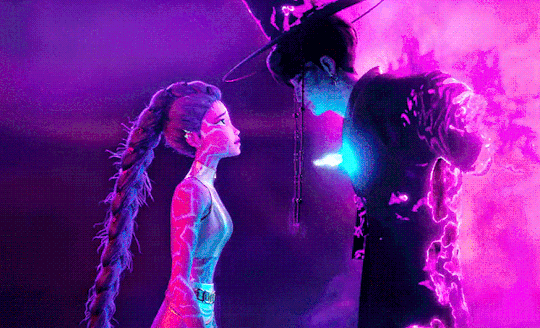
Yaaay 🎊 I am a positive influence for once/j!! hdwfejcmchevejkee I has skeptical of it too (mostly because the premise wasn’t selling me on it), but I’m glad I gave it a shot because KPDH really is such a gem 💎✨ The humor definitely isn’t for everyone; some friends of mine couldn’t get into it because they found the jokes too cringe or leaning too much into stan/celebrity worship culture. That’s okay, everyone has different opinions. The film has found its audience and they’re happy with it regardless ^^
I think part of what helped KPop Demon Hunters succeed is how far-reaching its message is. Its themes and story can be read multiple different ways, which are all equally valid. For example, many in the LGBTQIA+ community see the finale as a metaphor for Rumi coming out of the closet and her friends accepting her gender identity and/or sexuality. Remember how Celine kept telling Rumi to “cover up”, admitted she was getting over her own bigotry, and insisted Rumi could never talk about it? It gives similar vibes as shaming someone who wants to come out and confide in friends. Same goes for the scene when Rumi said she wanted “all of [her]” to be accepted, not for one aspect of her (ie her demon heritage or, in this case, gender identity/sexuality, to be conveniently ignored). Her demon markings going from purple to rainbow (a symbol commonly associated with the queer community) at the end is also cited as contributing to the coming out metaphor.
KPDH can generally be read as a “person learning to entrust friends with their secret(s)” story too. However, this can also be interpreted as (more specifically) healing from generational trauma. I’m not sure hos common this take it, but it came up a LOT in my irl friend circles (which are predominantly composed of what are considered ethnic minorities in our country). Note that Huntrix are from a long line of demon hunters, are beholden to a duty or a legacy, and have an mentor from the previous generation that encourages them to keep to the status quo by concealing their weaknesses and flaws. Rumi is also shown to have a lot of shame regarding her markings, and shame is pretty prominently used to shame people into obedience or following outdated traditions or rules. By covering up these problems, ignoring them, and/or trying to “fix” them instead of talking about the problems, they are perpetuated.
With the film being about Kpop stars, another interesting interpretation presents itself: critique of the industry and the fandom around it. For example, Celine insists to Huntrix that their flaws and weaknesses must remain hidden. The fans are not allowed to see idols at their low points or making mistakes because it messes with the fantasy of perfection many idols have formed around their images. And if there is a mistake made or publicized? Those idols can take a DEEP hit and the fans can turn on them or seek out the next best thing real fast.
Our protagonists are a group that has a positive relationship with their fans. Huntrix’s music quite literally brings people together, as it is the souls resonating with their songs that provides the thread for the honmoon. The Saja Boys, who rival them in popularity, have a far more sinister relationship with their fans. They manipulate, take advantage of, and hypnotize people into becoming fanatics who will literally lay down their lives/souls for them. This reflects the toxic side of stan culture—when fans become TOO obsessive and go out of their way to defend anything their idols do or say. Furthermore, we see Huntrix and the Saja Boys see their fans very differently. Huntrix states both in the beginning and the end of the film that they love their fans. The Saja Boys are largely the opposite—4 out of 5 members immediately lose interest and slump once they leave the autograph signing and are out of the fans’ sights. Their love is fake and performative. In creating this parallel, KPDH shows us the power music has to be both a force for good and a force for evil, how there are genuine people and fake people alike in the industry.
Whoops, this became a KPDH analysis and not a Twst one—
The point is, I don’t think there’s one obvious way to see the film; people are going to get something slightly different out of it depending on their own experiences and perspectives. As for how these could relate to Twst… Well, let’s start with some of the things you pointed out.
You mentioned how cruelty inflicted onto others and to oneself are equivalent +
I don’t think there’s idea of being held back by the belief that one is “born bad” is super applicable to Twst in-universe. Very few of our main cast believes they are born evil (and even fewer see themselves as evil to begin with). Leona and Malleus were born with immense power, Jamil was born into an unfortunate legacy, and Vil was a child celebrity constantly type casted and convinced he was the same as the roles he played. I don’t think any of these guys (or other characters) necessarily have the mentality of “I was born bad, so I can’t be capable of any good.” Most of them try to do good or to earn respect via their actions (save for maybe Jamil, who again is just trapped where he is in the social ladder). However, that idea definitely relates on a meta level. The whole philosophy of Twst is to show that no person is entirely good or evil and asks us to give second chances to its characters no matter how terrible their actions or first impressions are. We’re not meant to see the boys as static, but rather as dynamic beings who can grow and change to become better versions of themselves.
You pointed out how Jinu sugarcoated his past, but I also want to add he wanted to erase it altogether. This is reminiscent of how Azul denied his past self and wanted to delete all records of it.
I remember seeing a Twitter post basically saying “we need the OB boys performing something like Your Idol” blow up. Honestly though?? I don’t think that song (or the vibes of it) fits them at all. It’s too… sinister and seductive. I do not realistically think any of them would say this kind of flirty wish fulfillment stuff in canon. Like, I think it fits a fanon version of the OB boys (especially the yumeshipping side of fandom) just fine, but not the canon versions. The only part of Your Idol that sort of resonated with particular Twst characters was Now we runnin’ wild / You’re down on your knees […] because it vaguely reminded me of Leona’s Book 2: Usurper from the Wilds and his UM chant, which involves a command to kneel before him. Even then, I find it’s a very threadbare connection.
I sort of got Leona vibes from Golden too, but primarily the opening portion:
I was a ghost, I was alone
In the darkened abyss
Given the throne, I didn’t know how to believe
I was the queen I was meant to be
If you swapped out “queen” for “king”, I would 100% believe Kingscholar wrote that verse. It even mentions the ABYSS, which is the term Leona coins for the deeper dreams the darkness drags the OB boys into in book 7. And the THRONE??? One he doesn’t believe he deserves? C’mon now, that’s for Leona written all over it 😭
The song I actually think best represents the Twst boys—and, more specifically, the OB boys—is This is What it Sounds Like. I feel like this is the least talked about of the KPDH’s original songs, which is such a shame because I really love it and think it represents the characters’ growth so well.
Here’s a breakdown of the relevant lyrics and how I see them relating to the OB boys:
Nothing but the truth now
Nothing but the proof of what I am
The worst of what I came from, patterns I'm ashamed of
Things that even I don't understand
This phrasing automatically makes me think of the boys confronting their OB selves + Phantoms in book 7. They are quite literally facing down their true selves, proof of the darkest and most ugly parts of their personalities, the “worst of what [they] came from”, things they are ashamed of.
I tried to fix it, I tried to fight it
My head was twisted, my heart divided
My lies all collided
These read to me like each individual OB boy’s attempts to cope with their past trauma with various methods. For example, Riddle adopted his mother’s mentality, Leona tried to rebel against the expectations placed on him, Azul toughened up and became a bully instead of the victim he once was, Jamil attempted to free himself by manipulating others, Vil worked his ass off to prove himself, Idia became increasingly lonely and withdrawn, and Malleus used disaster-level magic to stop the flow of time. In most, if not all, of these cases, the boys actively lied about themselves and/or pretended to be strong instead of confessing to their weaknesses and seeking help.
Brownie points for these lyrics saying TWISTED 😭 It just so happens to fit with Twisted Wonderland so well.
I don't know why I didn't trust you to be on my side
Twst has been pushing the power of friendship since the prologue. We are told that NRC students are prideful and want to get things done themselves. It’s not until maybe late book 6 when we start to see the students working together and trusting their peers to fight alongside them or to stand beside them as equals. This trend continues into book 7, where we see various dorm members jumping after their dorm leader to help them (when they NEVER would before) and the dorm leaders trusting their members to support them. For example, Adeuce absolutely REFUSE to follow Riddle’s command to abandon him and to save themselves, and Azul + the twins trust he can make it out of his abyss on his own—he is no longer weak. There has been such a clear change in dynamic among the students from the prologue until now.
I/we broke into a million pieces and I/we can't go back
But now I'm/we’re seeing all the beauty in the broken glass
A very prominent and recurring motif in Twst is mirrors. These lyrics make me think of the mirrors in the Mirror Chamber all shattering. Broken mirrors result in 7 years bad luck and ruins the images of the students reflected in them. By every account, this should be considered a bad thing—but in a way, it can also be considered triumphant and hopeful.
A broken mirror is not nice to look at and the shards hurt if they pierce you. It’s literally something ugly and with the capacity to harm, a truth that brings you pain if you acknowledge it. But look again, and you’ll see your image is still there. Many smaller, fragmented versions. Bite-sized pieces of the truth, presented in a more digestible manner. Little by little, you start to appreciate what you see there. Again, it’s like the OB boys staring at all their fears and insecurities—but in facing them, they see how far they’ve come since.
I think this message is particularly powerful for Azul, who has a lot of shame associated with his youth. The day when he can look back fondly on his childhood and accept every part of himself, including the rotund crybaby he once was.
The scars are part of me, darkness and harmony
My voice without the lies, this is what it sounds like
The “scars” here are not literal, but moreso a representation of each person’s trauma. Our negative experiences shouldn’t entirely define us, but they are always going to be an aspect of us. A lot of the reason why the OB boys are the way they are is due to those experiences in their formative years. The bad is there, yes—but so is the good. Both darkness AND harmony are a part of them, and the moment they can admit that to themselves, they can be authentic and open with who they are.
Why did I/we cover up the colors stuck inside my/our head?
I/We should've let the jagged edges meet the light instead
Show me what's underneath, I'll find your harmony
The song we couldn't write, this is what it sounds like
Really beautiful imagery aside, I think this could be interpreted as the boys realizing they should put aside their difference snd come together. Each dorm is represented by different colors—so let those colors merge, not remain covered or isolated. You have jagged edges (ie you have trauma and issues?). Be open and vulnerable about them. Unite with your peers instead of pushing them away. Show them what’s beneath your proud exteriors, show them your good traits too!!
We're shattering the silence, we're rising defiant
Shouting in the quiet, you're not alone
We listened to the demons, we let them get between us
But none of us are out here on our own
Again, this touches on the theme of coming together—something set up since the prologue. In this case, the “demons” are not literal, but instead refer to dark thoughts that someone may be dealing with on their own. It’s a difficult task, but, as the lyrics point out, everyone is dealing with their own “demons”. It is this shared sentiments that gives the Twst boys common ground to stand on. Knowing that, it also grants them the strength—through numbers, through social support—to “[rise] defiant” against it.
So, we were cowards, so, we were liars
So, we're not heroes, we're still survivors
The dreamers, the fighters, no lying, I'm tired
But dive in the fire and I'll be right here by your side
This parallels the OB boys confessing to their failures and shortcomings. They lied, cheated, manipulated, and sooo much more. They admit to not being good guys, that they’re not worthy of being called “heroes”—yet they still survived for this long, and that, in of itself, is a commendable feat. They still have their hopes and dreams, and they’re still willing to fight for them. This point is especially salient because the OB boys all reject the dreams Malleus presents to them and want to actively fight for the right to make their own futures.
The “dive in the fire” part doesn’t have to be an actual fire; it could just mean a tough situation. In the case of the Twst boys, it CAN be an actual fire. More specifically, Malleus’s. I think of how the students had to take turns whittling him down by dorm. We get several moments of them struggling to hold the line, but they’re able to do so only because they have their dorm members by their side, thus affirming the fact that there is strength in togetherness.
Fearless and undefined, this is what it sounds like
Truth after all this time, our voices all combined
When darkness meets the light, this is what it sounds like
A summation of everyone uniting and sounding so much more confident in doing so!! (“When darkness meets the light” refers to when trauma, secrets, etc. are finally exposed and shared with others. There’s nothing to hide anymore, and that’s framed as a good thing.) The ultimate goal in Twst; no further comments.
#twisted wonderland#twst#disney twisted wonderland#disney twst#notes from the writing raven#kpdh#kpop demon hunters#rumi kpdh#jinu kpdh#celine kpdh#kpdh spoilers#kpop demon hunters spoilers#Riddle Rosehearts#Leona Kingscholar#Azul Ashengrotto#Jamil Viper#Vil Schoenheit#Idia Shroud#Malleus Draconia#book 1 spoilers#book 2 spoilers#book 3 spoilers#booo 4 spoilers#book 5 spoilers#book 6 spoilers#book 7 spoilers#twst analysis#twisted wonderland analysis#prologue spoilers#kdh
60 notes
·
View notes
Text
The psychology of Agent Kallus
Been thinking a lot about the fact that Kallus in a lot of ways, even post redemption, is not a good person. There often seems to be applied this black and white view on the Rebels characters, despite the show itself speaking against this, but I do think it's especially interesting in terms of Kallus. A lot of headcanons seem to diminish his involvement or responsibility in the genocide of Lasan. Additionally a lot of headcanons do the same in removing his agency in his own enlistment into the Empire. While I'm a firm believer that headcanons shouldn't be judged on realism or adherence to canon, I still want to use these headcanons as examples to analyze the further themes of Kallus' character and why they - in canon - matter.
So, a disclaimer; this is not an attack on the headcanons I mention, nor the people who created/enjoy them.
In The Honorable Ones, Kallus has a line that I think is really interesting, because Kallus affirms the role he played in the genocide of Lasan, but the way he phrases it sounds as if he's diminishing his culpability.
"On Lasan... It... It wasn't supposed to be a massacre. But I realized the Empire wanted to make an example. I know before, I took credit for it."
To me, at least, this reads as Kallus pushing the blame higher up. He might've given the orders, but he only did so because he knew the Empire expected it. This seems like cognitive dissonance, which can happen when there's a conflict between a person's actions and moral beliefs (very simplified).
Everything Kallus says during the episode seems to back this up. This quote itself is a great example of displacement of personal responsibility, which is a form of external self-justification. Basically shifting the blame to avoid the mental turmoil of facing the reality of one's involvement/responsibility. This is a common coping mechanism seen by soldiers. "I was just following orders" is a prime example of this.
Now, when Zeb questions Kallus on Geonosis, Kallus' response is once again SO telling. This guy is a psychology text book and doesn't even know it!
"The only thing I know about Geonosis is that the population is gone. I never asked questions."
This is a mix of selective perception and confirmation bias. Kallus is specifically choosing to avoid and ignore the things that point towards the Empire doing harm, as this would directly conflict with his internal view of the Empire and its role in the Galaxy. It's important to note, that him not asking questions implies that he knows what the answer would be. Otherwise, why would he be afraid to ask? Zeb is a smart cookie, 'cause he very much picks up on it and confronts Kallus, resulting in Kallus deflecting by changing the subject.
Z: "Well, maybe you should start. Or are you afraid of the answers you'll get? Afraid you'll learn the Geonosians were wiped out by your precious Empire?"
K: "And why would we do that? What could possibly be the point?"
Z: "Ah, good questions. Chase the answers, and maybe you'll learn the truth."
K: "You know, you'll never get out of here without my help."
This, imo, further proves that Kallus is actively, by choice, avoiding to think about the implications of the Empire's actions and his own involvement in this. If Kallus has to accept that the Empire's actions happened and were wrong, then he also has to accept that for his own actions. Zeb is directly challenging the justifications he has built up in his mind and Kallus has run out of excuses.
While I could go into the psychology of dehumanizing your enemy and thus justifying your actions by so, I'd like to discuss the implications of these themes in a character sense.
To me, it's incredibly important to understand that a character like Kallus is not a result of bad things happening to them. While these might be motivational factors and might shape their world view, Kallus certainly didn't end up carrying out a genocide on accident. A big part of his redemption is him coming to terms with this fact. He had a choice and he made the wrong one, time and time again. While Kallus started out with good intentions, he slowly became desensitized to fascist ideals and brutality. When things started going against his own beliefs, he instead chose to justify it as a means to an end - for the greater good. A greater good he could no longer recognize, but instead of challenging this he chose to ignore it.
I think it's incredibly interesting and imo it makes his redemption arc all the more realistic. It's not that he changed his mind about his actions, he just finally took accountability and action. He started asking questions
(I know this might be a bit too soap box-y, but it feels incredibly important to understand this now especially. It's so easy to fall for propaganda and to slip into fascism. It's important to be aware of the mindset that can lead to this and how to challenge it.)
162 notes
·
View notes
Note
Heeeyyy. I have a question. (SA trigger warning)
Do you think the desire for cnc stems from previous sexual trauma? I've seen an anon here say that she wanted to be full on tortured and held down by, was it Yunho or Hwa, I don't remember. I didn't even sense the consent in her ask. And I was like, I'd be down, and then I was like huhhh???? I would?????
I was almost sexually assaulted by an agemate when I was 14. Back then, I felt horrible. Like, I really went through it. Asking myself why I was even there in the first place yk? Blaming myself, and so on. I was also sooo against any form of non-consent, even if it was consensual. But now that I look back, I'm like, ugh I was over reacting and if I went back in time to that moment I would just tell my young self to shut up like it wasn't even that bad. (My morals do prevail and I know that any kind of SA is not acceptable. If it were anyone else, I would NEVER say this.)
But now I am so very willing to participate in cnc, 100%. Even take part in various kinks. I think I just grew up and became more self aware and honest with myself, but I would like to know if you think my previous experience contributed to this.
Also, you don't have to answer this if it makes you uncomfortable. I love love love your page, like it constantly reminds me that I'm not odd for liking the things I do😭🫶🫶. Thank you so much. You're a blessing to many of us, and some hATERS (cue annoying people) cannot even seem to understand that. Talking about lists and all that. Ew
Such topics do not make me uncomfortable, don't worry🤭its literally my job atp (im a psychologist now so I mean it)
First of all before I get into it, I want you to know that you were never the blame. Its not your fault that you had to go through something like that. I'm so sorry for what happened and I hope you are better now. And you feeling bad about non consensual plays for some time is totally normal, don't think that you had to enjoy this kink right away.
Honestly I had to research quite a lot on this topic before because even though I knew it was a perfectly normal kink, the reality of r*pe makes you doubt yourself. So I wanted to find out if there was something wrong with me or not because no one around me irl likes cnc. They think its extremely weird. It turns out nothing's wrong.
There are many reasons why a person can be into cnc, involving extreme versions of it. You can already guess some of them, which is that it's a really strong roleplay for power dynamics. Whether you are the agressor or the victim, you give in to the most extreme level of domination or submission. It's also primal. It can easily bring out your animalistic sides. Many people enjoy this. So for example if you like being the victim it can simply mean that you like not having control. Its a good way to relieve stress and release adrenalin too.
The other reason is that CNC can actually work as a coping mechanism. In fact, kinks and role plays are important for human psychology. They can help you resolve or at least deal with unresolved issues in two main ways. The first is that you might have experienced something related to the said kink/rp. In this example, you might have actually experienced SA. It's not easy to accept a reality like this and it can easily damage a person's identity and self-perception. It can take so long to get better. So you need to find a way to cope with this and resolve it. So over time you can start enjoying CNC as it would give you a sense of control that you couldn't have during the bad experience. You can control, change and alter the way the role play can go. This can help you to accept what's happened in a less damaging way, assuring that you are in control. It can also help you relive the experience over again, although this can sound bad, you can become insensitized to the situation.
The second way is that these unresolved issues don't have to be anything related to the roleplay. Meaning you don't have to experience SA to enjoy CNC. Such symbolic roleplays can help you deal with repressed emotions and help your subconscious to process the material there. As such roleplays also have clear cut archetypal figures, they can help you deal with deep-seated symbols, personas or narratives. Do you know why they say people with daddy kinks don't have a healthy relationship with their dad? Its not true all the time obviously (bc its so common now) but it's a good way to show you what I mean.
So no, not all people who enjoy CNC experience SA or similar events. But if you had, it can help you cope too. But kinks and fetishes are way too deeply rooted in your subconscious and they are madly complicated. Most of the time you will end up feeling so lost when you try to find out why you have a certain kink/fetish. So you're not really supposed to know why you like the things you like. You should let your psyche and subconscious deal with them. As long as theres constent and they dont hurt other people, you can enjoy anything. Its ok. Don't let people make you feel bad for enjoying CNC. Trust me, people who like this kink are actually really nice and care so much about their partner's well being. Meaning the agressor roleplayer don't actually want to r*pe anyone irl. That's what I've seen.
Overall, in your case, it might have contributed. And it's ok. Keep enjoying your roleplay and let it help you resolve your trauma.
And thank you so much I hope youll keep enjoying my blog and i was able to help 🥺🥹💖💖
14 notes
·
View notes
Text
got possessed and decided i must make a post about noahs character arc in dramaturgy Immediately
ok,, so the gist is friends. this is the Give Noah Friends Arc. he starts with no friends and then he gets some.
and he also gets some character flaws. for fun. dont worry he grows he develops,, umm so noah [in this AU] as a Character is very deeply rooted in two things: his defense/coping mechanisms, and his background in the industry.
to cover: his defense/coping mechanisms. they are. Bad. his primary defense throughout the show is his nonsubstance itself — but beyond that, the way he intentionally makes himself unpalatable. he makes jokes and seemingly mean-spirited quips at peoples expense and that would be innocuous if it wasnt all he was. but he very intentionally doesnt have character beyond that.
its like advanced self isolation (and regular self isolation when he refuses to interact with anyone after he gets eliminated and generally when hes off camera). additionally (to bring in themes from my original two posts) he creates a severe disconnect between noah The Person and noah The Character and it seeps through to his perception of his castmates as well.
^ this ties back into his Industry past, which,,, kinda fucked him up?? its not like its a normal developmental setting and it shows when hes being noah The Person. he doesnt really know who he is in normal settings; hes so firm in his identity within the industry and his role in it, but in Real Life, Teenage settings? clueless. has no idea what hes doing.
his severe disconnect of person and character also affects the way he sets boundaries, which is to say, hes really fucking bad at it. entertainment industries are Sketchy As Hell, and he kept his head afloat by navigating the system and working within it, but never learned to set clear-cut, do-not-cross boundaries in his relationships as a result (smth smth setting those limits were ‘taboo’ within the industry and could limit the work you got or how many people were willing to reach out)
< tacking onto that parentheses thing, hes also wildly unfamiliar with non-transactional relationships (in this way, him and alejandro are very similar). hes grown up seeing these people around him play nice for the strict purpose of give-and-take and has very few examples for things that are not that. he constantly struggles with understanding that he doesnt have to ‘repay’ things or ‘give’ something to be treated fairly.
(also smth to be said about his ‘keep everyone away’ thing where he silently thinks that even beyond the cameras if he tried to form relationships on the show he would be treated poorly/‘trampled on’ because his nonsubstance wouldnt allow him to ‘give back’ in a way that would make those people see him as worth treating fairly.
his castmates are effectively part of the industry now, why wouldnt they treat him like hes always been taught the people in the industry would?)
^ and again, it seeps through to his perceptions. to things like the love triangle, or sierras obsessive behavior towards cody; noah has trouble understanding why people like courtney would be distraught at it, because to him he can only see it in a transactional light (amplified by it being an on-camera relationship eventually turned plot point). similarly, it takes him A While to properly understand codys distress because to him it seems like sierras giving and he should just ‘return something’ to make them even (not really hitting him that he cant ‘return’ feelings like that).
which brings be further into his overarching Arc. you know, the character one. kicked off initially by wanting to unmask alejandro as a patent fake, he gets his development in other areas too --- like finally getting some real-world experiences with kids his age instead of studio execs three decades his seniors.
it gives him proper, real point of reference as to what matters to his peers beyond a clinical sense and observation --- in short, he learns to better understand the castmates around him beyond what the industry exploits them for, and in doing so he develops past his initial stunted-ness.
< and that in turn helps him learn past his slightly (very) fucked up headspace and perception that his childhood environment created.
(and to slot in now, noahs character in the AU is perfect for consistent themes of internal conflict. how he initially builds up relationships, conflict. struggling on whether to keep the act or expose alejandro, conflict. being hyperaware of both the audience and cast perceptions of him, conflict. realizing his battle has become two-sided and alejandro and thus the cast/audience is catching glimpses of his Person, conflict. realizing hes in too deep and now the plot itself demands him from a meta-ish standpoint, conflict. just conflicts all around for this guy.)
now there is the whole... being a person on camera thing. which is in essence what the entire AU and story arc thereof is centered around: noah learns that he can Be a Person and drop the overly sterile self-regulation sometimes. im,, slightly torn on how exactly to cement this kind of shift in behavior,,
< as it makes sense in my head, noah would be more willing to relent his vice-grip on his facade for the sake of achieving his goal (being expose alejandro outright/at least see whats underneath). so therefore, for the story to progress, there would have to be those opportunities, and for it to make sense those opportunities would have to increase as the plot goes on (and, ofc, inline with alejandros own relent on his mask for the sake of going back and forth in some weird bid for who can expose the other and still keep up their own facade)
^ this is kindof what ive 'settled on' to build up the rest of the AU events on (i will have to find some way to slot in those opportunities proper uuuughghgggh) but yet again if Anyone has Any thoughts at all,, hand them over pretty pls pspspspspspsp
#this went off the rails does this even count as an analysis of a character arc#uhh whatever#before bed rambling is my favorite type of rambling#wrote half of this during a baseball game being blinded bt the setting sun btw#iidk what this adds to the post i just want to ramble somewhere#dramaturgyAU#total drama#td noah#character analysis#again umm look over inconsistencies pls and thanks#or tell me maybe but be nice pls
10 notes
·
View notes
Text
i have FINALLY figured out the throughline in my characters!
#they're trying SO HARD to be good and be better#like. will's entire deal is trying to find control of herself again and help people and Find Identity#and LORELEI'S entire deal is fucking up so colossally and her instinct is to be selfish and wildly self preserving#but she's trying SO HARD#she's staying with rowan and callisto because she cares about them and helping them puts her in danger and away from naia#and even selene ran away from home because she hated it and left the hunt because it was unhealthy for her#unnamed jessegame character didn't even MAKE IT to the olympics and all she wants to do is prove herself (and provide for her family??)#and cadence. well she's pretty well adjusted and is generally very kind but i think being so focused on leaving the museum is Something#anyway it's :D to get what kinds of characters i usually make :]#ch: will#ch: lorelei#ch: cadence#ch: selene#i think it's cool to have characters with growth inherent in their motivations and that want something SO badly#even if what they think they want isn't necessarily best for them!#for example i think will's coping mechanisms and self perception are Really bad#but she'll get somewhere eventually or she'll die which. is somewhere#gonna put better in the morning and i wanna get better on all my character playlists slash jay except for maybe i wanna get better on wills#ttrpgs :]
9 notes
·
View notes
Text
c!niki and c!wilbur enjoyers. pspspspspspsps
alright guys so last night i rewatched pretty much all of the pogtopia arc. and this isn’t meant to be a big, important analysis post (it’s kind of incomprehensible), because my brain is fried from, you know. rewatching pretty much all of pogtopia. but i do have some stuff i’d like to say.
(this also just became a niki meta sorry i love her. i really just got emo about her during the second half of this and it got long. i have a lot of feelings about her and wilbur’s friendship.)
it’s a pretty general conclusion that wilbur’s real “downfall” began on october 8th, during the stream “who are you go away”. of course, his spiral and the process of him losing faith had begun much earlier, more around the end of the first war or during the election. but the big switch, so to say, was definitely here, when as wilbur walks back from schlatt’s announcement, he asks tommy if they’re the bad guys.
this entire scene was so interesting to me. wilbur here is a man who has lost hope, someone who is backed into a corner morally and has nothing left. he points out that they can never really reclaim l’manburg without forever tainting it, and that schlatt knows this. the entire half an hour or so before, schlatt has been taunting wilbur about losing that power. the emphasis of the festival on “democracy” is so clearly a barb thrown at wilbur, and it works.
wilbur’s “nothing left to lose” in this vod is a mirror to niki’s “you know what they say about a woman who has nothing left to lose”. this will not be the first time they mirror each other.
basically, wilbur’s angry. when schlatt announced the festival, wilbur realized that maybe it wasn’t a terrible thing. so once he worked around into the mindset of “we’re the bad guys”, he was able to justify saying he was going to blow up the nation with no remorse. he wants chaos! he wants no survivors!
does he do it? god no.
during the streams leading up to november 16th, wilbur is consistently scared. he goes back and forth on it, and makes multiple “conditions” that determine whether he’s going to do it or not, almost begging someone to stop him. he whispers to himself that he’s scared, that his hands are shaking, that he’s not sure if it’s the right thing to do. because despite what he says about “not caring about any of them”, the instant niki is threatened after tubbo’s death, wilbur walks up to schlatt and tells him that if he’s going to kill anyone it should be him. later, when quackity and tommy talk him down from pressing the button, he can’t press it because they’re there and he can’t bring himself to kill them as well.
but he has no problems with putting his own life at risk. he refuses to wear armor half the time, and actively places himself in harm’s way to save others. he still cares about everyone else, as much as he says he doesn’t. even when he does cause harm to others, during november 16th, he immediately begs phil to kill him. “look, they all want you to.” he can’t live with what he’s done, and how he’s hurt people, but he couldn’t allow manburg to continue.
the man is terrified and angry and he can’t win. and even as he tries to stuff himself into the mind of someone who doesn’t care, he cannot. when he finally does, he cannot live with being that person.
but the reason i rewatched this arc was to see niki’s point of view, especially after her statements during her last stream. i genuinely think that wilbur’s only betrayal of her was pressing the button, because he betrayed everyone. they might have known he was going to do it, but they had faith he wouldn’t.
wilbur cared a lot about niki. her life under schlatt was awful, wilbur hated that she was suffering, and the scene where wilbur plants himself directly in the center of the festival and tells schlatt to kill him instead hits pretty hard. he has the argument with schlatt, and then turns to niki and tells her to run. he then hits people and sprints away, trying to give her time to escape.
this is also when he asks her to join pogtopia, because now that schlatt has said he’d kill her, it’s a safer place for her.
so the man did care about her. niki is angry at the memory of him that she has. it’s been twisted by time and her own grief and paranoia.
in rewatching pogtopia, i realized that a lot of people hate the memory of wilbur. not him, and what he did. they think he didn’t care. and to quote hamilton (apologies):
“history obliteratesit paints me in all my mistakes”
does niki have a right to be mad at him? absolutely. he caused direct harm to her by blowing up l’manburg, once it was reclaimed. but she’s wrong that he never cared.
(an interesting note: wilbur only blows it up after techno starts fighting people outside. he hears it, and says “look, they’re fighting”. he didn’t re-initiate the conflict of the country. the fact that even after peace was won people were fighting just gave evidence to his belief that the entire country was corrupted.)
niki has been hurt a lot, and wilbur has things to answer for. but we as the audience know that her statements are just her perception. she is a character who acts on perceptions. the entire stream was in black and white. during doomsday, upon seeing wilbur log on (as ghostbur), niki has a panic attack and destroys her bakery, trying to rid herself of the pain of the memories. her lines during this stream are chilling, whispered repetitions that are a mirror of wilbur’s end.
(paraphrased, it was long and confusing but there are a few bits and this was the essence of it)
“wilbur is gone. this isn’t happening. he is dead. l’manburg is gone.”“it is real, i am real, he is real and he is dead.”“l’manburg is gone, i am real, i am l’manburg”.
(god. dude i could spend Months analyzing this one stream alone. there’s so much here.)
doesn’t that sound a bit like “my unfinished symphony”? wilbur and niki both attach their own self to the nation they fought for, and can see it as an extension of themself. they both destroy parts of it in acts of fear, attempting to save everyone else from what they’ve made.
what i pulled away from niki’s stream is that she’s not healing. i remember the chamber she locks herself in at night. i remember her refusal to eat. i remember how she was so angry at tommy, and she later realized that anger was misguided. niki genuinely believes that wilbur did not care about her, and that’s not surprising: when he died, she denied the fact that he was gone. she represses the things that she can’t handle, same as lots of other people. it is easier for her to pin her hurt on wilbur, because she needs somewhere to pin it. people feel more in control if they’re angry, not sad.
the song cc!niki said was for her character really emphasizes this. it’s a coping mechanism.
but even condemning wilbur won’t help, because she will still never get closure. niki cares about what others think of her, and so she can’t move on from someone hurting her. she can’t move on because she thinks he hated her. she is angry that he is back, but it is an opportunity for her to heal. she couldn’t heal when he was gone. she’s not the only one with a negative perception of wilbur, after all. he has one too. the two of them really need to talk.
i want niki to be healthy and safe. i want to see her heal so badly, and i do think it will happen. after wilbur died, his betrayal of her stayed with her, and it eventually became her memory of the betrayal that she hated, not the thing itself. it’s been months since it happened. niki wants to find an outlet for her hurt, because she wants to feel better. there’s a pattern i noticed: she only gets mad at people once she hasn’t seen the person themself for a while. and once she sees them and talks to them, and realizes that they care about her and don’t want to hurt her, she stops blaming them for it. she only hates her perception of them. example one? tommy.
man was in exile for a long time, and when he came back he “brought” fighting. that’s how niki saw it. but the fact that after she spent time with tommy (trying to kill him but. details, details) she forgave him because she saw it wasn’t his fault is a really good sign.
i genuinely think that speaking to wilbur will help niki, and it will also help wilbur. after all, they both hate wilbur. the entire perception of wilbur as some heartless, crazy manipulator needs to be shattered for both of their sakes. they both buy into it.
i want niki to know that others care about her, and that she has places she can feel safe. she hates that wilbur is invading the syndicate, because she’s scared of his memory hurting her. i don’t think wilbur will hurt her on purpose, because even though he sees himself as awful, he doesn’t hate her. he never did. usually, with people who have hurt someone else, i want them as far away from the person they hurt as possible. if wilbur does hurt niki i’ll probably cry. but again, it’s not him that hated her, or really him that hurt her in the way she thinks he did. when wilbur was dead, niki didn’t get any better. her memory of him festered and made her feel worse. that’s also why niki killing wilbur or hurting him somehow wouldn’t help her heal. i want wilbur to explain that he didn’t hate her. is wilbur even close to self aware enough to help niki? nah. this is going to take a Long time, and it’s going to hurt.
last thing i swear lol
during niki’s stream, she says that wilbur manipulated her. again, i watched pogtopia last night, and i’ve watched the rest of season one recently as well. i genuinely don’t see it. but i do think i know why she said it.
during season one, wilbur doesn’t manipulate niki. he doesn’t have a chance to later, he’s dead. so then, what is she talking about? of course it’s a perception, same as a lot of her other claims. i think she’s talking about how she cared for l’manburg.
niki joined the server as wilbur’s friend, to join his nation. she grew to care for l’manburg. she devoted herself to it, same as he did. but doomsday showed us that she hates that. in niki’s eyes, l’manburg only brought pain for people, and because she ties herself to it, she hates that she ever cared about it. she can’t allow herself to care for it, because it was used to hurt. so how does she cope with knowing that she once did? she pretends she didn’t.
if she can convince herself that it was wilbur who convinced her to care about l’manburg, she can avoid blaming herself for her own pain. and yeah, she shouldn’t blame herself for it. it’s not her fault. the entire situation is tragic and a little hopeless and once again really makes me hope that she recovers. l’manburg was ruined for her by others. schlatt, techno, dream, wilbur. again another place where she and wilbur are similar: they convince themselves they never cared about l’manburg because of the hurt it caused.
to summarize: wilbur’s going to get a shock soon. don’t know when, but probably the prison visit. something is going to shake his perception, the story is hurtling towards that. once he is able to take responsibility for what he did, and feel safe (because a lot of what he does now is out of fear of being alone or useless), then he and niki need to talk. niki needs something to get her out of her own head. she’s spiraling too. they are essential to each other’s recovery because of how much they meant (and mean) to each other.
anyways i miss early season one niki i liked it when she was happy :(
~ Lad 2
#wilbur#c!wilbur#niki#c!niki#dreamsmp#dsmp#mcyt#rp#long post#dreamsmp analysis#dsmp analysis#revivedbur#pogtopia#lad speaks
269 notes
·
View notes
Note
Hi! Hope you’re having a good day - mines been pretty shit tbh so if the tone of this is dumb I’m sorry and it’s also very long and rambling so feel free to ignore but I’m just kind of shocked to see you defend being bdsm (aka being against the sexualisation of abuse and violence particularly against women)?
Like ‘what a man does in the privacy of his own home is his own business’ has always been peoples response to mens abuse. I just don’t understand how is it not incredibly fucked to get off on abuse? How is the physical damage done when strangling/beating/hurting someone in one of the millions of ways people (men) hurt each other (women) different when done consensually? If my boyfriend hits me during sex why is it a big deal if he does it during an argument if he didn’t even hit me as hard during the argument as he did in bed? What if he strangled me in bed (something that could kill me and is one of the biggest indicators that a man will kill you) then hitting me isn’t actually that bad in comparison considering the level of harm. What is the difference between ‘after care’ and bringing your girlfriend flowers after hitting her? How does it not create the same trauma bond? A lot of people into bdsm make it very clear that they are mentally unwell (not judging, I am too just different poor coping mechanisms) and I just don’t see how being a masochist different from self harm. How is bdsm not the biggest example of rape culture? How can you recognise the patriarchy’s influence on so many womens choices but not the choice to want to submit sexuality? How are teen girls supposed to cope with their boyfriends literally wanting to beat and rape them but all the adult sources around them are telling them thats totally normal and not dangerous they just need to consent? Because teenage girls are amazing at enforcing their boundaries and totally don’t give in to peer pressure or do things they don’t want to do for male approval. How are you meant to break up with a man who you know enjoys and is capable of beating and raping you?
TLDR : I’m just trying to understand your perspective because it seems very contradictory to your other views like being against rape, violence against women, anti racist, anti incest ect. just everything that bdsm sexualises and normalises
No you're all good, I don't mind answering lol. I'm not letting this be reblogged for obvious reasons though.
I completely agree with you in that societally speaking, BDSM is constantly used to excuse violence against women and it's really fucked up to get off on hurting others, and any man that says they're into BDSM on principle should likely be in jail.
That said, I also think that in the context of consensual romantic sexual relationships between adults, it's possible to enjoy certain things on occasion that aren't super vanilla on principle. And, I'm not really talking about hookups here, I'm talking long-term relationships with people you trust lol. I'm also not giving teenagers sex advice and I think "blowjobs are empowering" feminism that young millennials and Gen Z was raised on did more harm than good to our perceptions of healthy sexuality, but the rumors are true: I, an unmarried adult woman, enjoy sex with people I romantically like and trust as people lmao.
But to clarify, I'm really not a proponent of anything truly extreme, and I'm extremely intentional about setting boundaries and if anybody crosses them, they get blocked and banned for life. I'm generally cool with trying sex positions, but both parties always have veto privileges if something is painful or uncomfortable or simply not enjoyable. And personally, anything involving metal, spanking or hitting, choking, etc. are all total no-gos for me and I will never be swayed on that. A light hand on the neck is not remotely the same thing as asphyxiation, and to even get to that point, I need to trust the guy.
And, I would never trust let alone fuck a guy who can't get off without that stuff! My point is that it's okay to try things out, whether that's basic kink or weird sex positions that you fall out of and laugh at yourselves, not what you do every single time you have sex. If a guy whines about women being boring in bed or "vanilla," kick the man to the curb lmao.
All that said, I would never tell women they're bad people if they are against stuff I'm personally comfortable with. My point is just that sex isn't like a cut and dry thing, and it's really healthy to communicate and discuss what you like and don't like with your partner.
Does that make sense lol?
6 notes
·
View notes
Text
Noncon stories, Fantasy vs. Reality, and more. fucking. issues.
Recently, I’ve been hit with some drama as to why I’m a “bad person” by various, anonymous users in this fandom. I thought I’d try to address the claim, address my stance on fics that involve noncon, and what I think about the “Tumblr mentality” after everything I’ve seen of this place. I should also note that I’m going to use the specific words and phrases I’ve been forced to constantly repeat as explaining my stance has been very difficult for me, as I’m a person who’s apparently challenging to understand.
This is going to be a long post, with subjects that's obviously going to trigger people so here's a warning right now..
That being said, I’m going to dive into this with some shit I’ve definitely said before:
“Consensual Noncon” Kink
The Appeal of this Theme in Fanfiction:
I don't think calling fics that involve noncon "rape fics" and those who enjoy it "getting off to rape" is a very good way to put it. Many engaging and well done media pieces often involve some very dark themes. Again, Monster by Meg and Dia is a song that features the main character sexually abusing a girl he met. You COULD call this a "rape song", but acting as if the rape is the only thing that matters in this story would be pretty..naive. The story has to do with an emotionally, and physically neglected/abused boy, who grows up and becomes an attention/love starved monster who's SO starving for validation, that he believes forcing himself upon a girl he knew would "prove" to himself that he's capable of being touched and loved. Of course, the main character eventually realizes that rape is not love, that what he did was wrong, and later kills himself in his own bathtub with kerosene and a match.
However, the assault aspect of this song is still a meaningful and alluring part because it talks about how emotional and physical abuse can warp someone's perspective on reality, to the point where they think forcing someone to "stay" with them is how to create a healthy relationship. That's the same energy I have for noncon fics, especially in the slasher fandom. Many slasher fics that contain noncon often have to do with the slasher preying on the reader because of their own fucked up mind. It's intriguing because, let's be honest, pretty much none of the slashers are in a pretty good mental space lmao. Thus, noncon actually falls more in line with how slashers would go about what they believe is a "good relationship" more often than quite a bit of fans here seem to believe. Again, Michael got boners, Jason chained someone up, Fredddy smooches people against their will, Billy Lenz is a sex offender, Chromeskull makes snuff, yada yada yada, you know the drill. That being said, it's interesting to see noncon being expressed with these characters because it gives us a new perspective on how fucked up they'd likely be if the world of sex and relationships was introduced to these characters.
Now why would some people become sexually aroused by the events of the story? First of all, how does “Consensual Noncon” kink work?
u/Jumbledcode. (2015). ‘Can anyone comment on why people (someone like me) enjoy rape/non-con story lines?’. r/TwoXChromosomes.
“I'd suggest that there are several factors that make up the appeal of non-con fantasies.
Guilt/Self-image: For many people, their sexual/relationship desires don't necessarily match their image of themselves, or alternatively they feel guilt over others' perceptions of those desires. Rape fantasies allow them to mantain some illusion of denial over their desires while still indulging in the idea of them.
Responsibility/Laziness: The appeal of abdicating control isn't limited to avoiding guilt; it's very tempting to want a scenario where you have no responsibility for maintaining your lifestyle/happiness. Similarly to before, it's the appeal of being given what you secretly want without even having to choose it.
Transgressiveness: A rape scenario has overtones of danger and taboo-breaking. These can easily be exciting and can therefore be a turn-on.
Desire: Being wanted is often a huge turn-on, and the idea of someone desiring you enough to break laws and disregard everything to have you plays into this feeling.
To me, it seems that most people who fantasize about being the subject of rape do so due to some mix of these motivations I've mentioned. Of course, there are also those who have experiences which have taught them to associate non-consent with their sexuality, but that's a separate issue”.
What if the Fanfic Only Involves the Act though? Wouldn’t it Encourage Actual Rape?
Let’s differentiate fantasy and reality. Towards those with the noncon kink: it offers arousal because of the ideas listed above (the idea of the reader not having to make any moves and the character doing the “intimate work” FOR them, the excitement of such a taboo sexual encounter, and the feeling to be desired through an altered, brutish encounter). Rape is the use of sex to remove control over the victim’s mind and body. The readers DO have control over whether or not they get to “encounter” (the choice to even read) this fantasy, so right away consent is present in reality, and no actual rape is being done.
Now does this mean that the kinkers are getting off on the idea of rape? Not really.
The thing with self-inserts is that it allows you to be connected to the story. That way, even if the story has you bruised up and begging for mercy, a part of you-you (if you’re a kinker) wants to keep reading it as you find it exciting. That way, as you and story-you are connected, what you really want in such a fantasy is for it to keep going despite the brutish, possessive, however yet desired nature of the character you’re dreaming about dealing with. (repeat: the idea of the reader not having to make any moves and the character doing the “intimate work” FOR them, the excitement of such a taboo sexual encounter, and the feeling to be desired through an altered, brutish encounter). That being said, it’s still entirely possible for kinkers to have their personal space and wishes crossed, and ultimately assaulted. Us enjoying the fantasy of such a reverie sexual encounter does not spell out to real life because (in reality) we’re not horny all the time, we would still like our bodies to be respected when we find it necessary, and we still have feelings as we’re still human.
“Fantasy (including video games) leads to violence” fallacy.
It would be like assuming that shooters in games like GTA fantacise about murder, encourage it, and would do it in real life. Taking fabricated anger out on virtual bodies or NPCs is quite different from the weight of murder (the killing of another human being). One can play video games with lots of violence towards such fabricated characters, while discouraging violence towards human beings. The act of using a game controller to beat up Donkey Kong in Smash, to shoot Nazi zombies in a Black Ops game, or to kill a Geisha in Little Nightmares is incredibly, and immensely different from completely eradicating the life of a person on Earth, and to assume that everyone who plays violent video games would spill out to violence in reality would be to participate in a ridiculous fallacy. Yes, there are outliers who are feeble minded enough to let their fantasies influence their actions towards actual people, but I must repeat that there are also people who utilize these fantasies for their personal satisfaction, while understanding the weight of the real world around them (and choosing not to act so detrimentally). Therefore, it wouldn’t be fair as it would be unnecessary to blatantly say that all fantasies are horrible and should be entirely eradicated if there ARE many people who ARE aware enough to understand that some thoughts are better off staying in fiction.
Now is the time to address what’s been said:
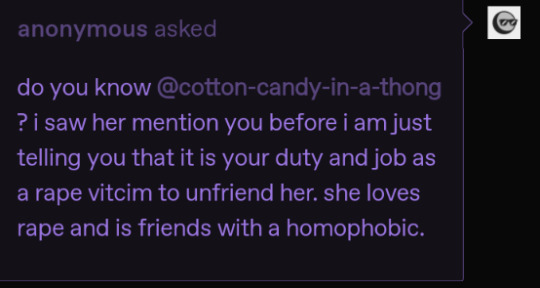
...Firstly, I think it’s very disgusting that random users, on Tumblr of all places, are trying to manipuate random victims of sexual assault into hating something or someone just because these users FEEL like “it’s the right thing to do”.. People, victims of sexual assault aren’t your fucking dogs. They’re not carriage horses, they’re not your work mules, they’re not your guns and swords...they’re just people who normally wanna be left the fuck alone like everyone else. Plus, there ARE people who have experienced sexual assault who take joy in reading such dark storylines. What would these users have to say to them? That they’re not “real” victims? That what they’ve experienced “never happened”? That they’re “just like” their own perpetrators for using the consensual nonconsent to miraculously help them overcome their trauma? Should they really abandon their coping mechanism just because there are other victims who cope in different ways?
..If you seriously believe that all people who have gone through a traumatic event are gonna cope in the exact same fucking way, you literally don’t even know enough about PTSD to even be making a bold statement about cope.
This is the part where I finally realized that people, and especially those on Tumblr, don’t actually care about rape victims as much as they may claim. Many users on here, on this platform and in this fandom, don’t truly give a flying monkey shit about rape victims as people, nor what they have to say about the subject. Rape victims..on this place..seem to be used mainly as a means of figurative weaponry for a group’s subjective morality.
I find the similarity close to radical feminism. Radical feminists often believe that women, from near and far, have to do everything in their power to “destroy” the patriarchy. This would mean disobeying the societal expectation of women, even if there are some women who take joyment in engaging in some societal standards for their personal liking. An example would be sex work. Radical feminists acknowledge the flaws in performing sex work, but believe that NO woman should EVER partake even if the woman wants to do it out of her own free will. In demonizing and ostracizing any woman who doesn’t fall into the radical feminist agenda, radical feminists actually contradict their purpose to “let women be free”. At this point, you realize that radical feminists often don’t actually give a fuck about what any woman wants for herself. Instead, radical feminists want to utilize any woman they can find just to flip off men as a group.
In Tumblr users trying to “stand up” for rape victims for their personal “holier-than-thou” ego, they fail to care enough about the very people they defend to understand the dynamics of some of their coping mechanisms, thus begin to bully some members of the group they claim to protect because of the very narcissism, misunderstanding, and controlling nature going on behind their own “activism”. So now that some users have found something to hate, in this case being noncon stories, they attempt to manipulate victims of rape into ostraciszing and demonizing fantasies and other victims of rape just because the “activists” themsleves don’t like it. Even trying to argue that rape victims have a “duty” to agree with everything these “activists” try to do for them.
Sounds awfully familiar to the attitude democrats have towards any minority when it’s time to vote. “I care about you...but you have to agree with everything I say and believe because I want what I think is best for you. If you disagree with me, you’re ungrateful and a traitor”.
Now...a little about myself.
I’m not sure of everyone else who’s into the noncon type of story, but I use it to get away from my past. In noncon stories, I want to read what happens in the chapters. I want to imagine them for morbid curiosity and arousal I feel at the time being. In reality, my attackers didn’t care when I wasn’t in the mood, and never gave me a choice. In noncon stories, I get to choose the character I want to encounter in the fantasy and NOT have it picked FOR me. In real life, I didn’t get to choose who did some things to me. In noncon stories, I get to stop reading them and do something else whenever I’m not feeling it anymore. In reality? My attackers kept going because, in the situation, it was no longer up to me. After noncon stories, my body doesn’t walk away with bruises, bite marks, and physical reminders every time I take my clothes off or try to masturbate. In real life...that shit can mark you, disease you, and then traumatize you. With the stories, I get to delete my search history, join another fandom, and act like nothing ever happened. For reality? Your own body is a reminder of what happened because it was real. In reality, I’m NEVER gonna fucking forget what happened. I’ll be lucky if my own mind and body doesn’t haunt me for at least one day..
So seeing that someone, and probably multiple people not only tried to use victims of sexual assault for their own “go get em” dogs, but to try and phrase me as someone who loves and encourages such an assault on human beings? After the things I felt? After the things I tasted? After pathetically searching for the support of relatives, just to get shut down with “you’re lying”?..
...All the times I've been held down..threatened..clothes getting snagged off..parts being opened and touched after I've fought to just get the fuck away from certain people...
According to this anon..."she likes rape".
...I guess I just fucking LOVED EVERYTHING THEN.
You know...all my life I’ve been misunderstood by many people. It’s honestly really disappointing that even now when I’m better at explaining myself than ever, I’m STILL being phrased as a “psychopath” by random people who haven’t even taken the time to even know me. Not even from a minute-long conversation through a damn computer screen. And you wanna know the funny thing? I’m probably being laughed at as this is being read. Some of these users, these internet stalkers, are probably giggling, smiling, and saying “Haha YES we GOT the bitch!! Cry you piece of shit SLUT!!”. So maybe explaining my past experiences to help everyone understand why some people may use noncon stories to their fantasy advantage is gonna land me messages going: “You haven’t been raped you lying bitch”, “Maybe you should get raped again”, “You definitely enjoyed it”, and the overused, yet strong “Kill yourself”.
So how am I gonna end this message? With me saying that many of you, who THINK you’re doing the right thing by justifying harassment and trying to manipulate others into joining your little crusade to bully people away from the fandom (over extremely mundane fucking things)...aren’t really good people. At best, in this case...you’re fucking stupid. You will never truly speak for any of the marginalized groups you claim to know like the back of your hand. Simply, you will never. be. a hero.
If by chance, by an astrological chance..that any random user wants to come up and apologize out of the blue for talking such shit and for saying such things..I don't even wanna hear it...just get the fuck out of my face..
#slashers#slasher fandom#tw noncon#consensual noncon#fandom drama#long post#past experiences#anon ask
22 notes
·
View notes
Text
Bucky is and always has been very wrapped up in his identity. You can see it in catfa—the bar scene particularly stands out to me as a scene that shows exactly how this traumatized person seeks to take back control by writing the narrative, and how it doesn’t always work when other people are involved.
In the bar scene he’s just been captured and experimented on and generally been through hell for the last however many months of war. He’s grasping at the things he knows about himself for a sense of normalcy after trauma—flirting with Peggy, being the boy the girls love, for one. But there’s also the claiming Steve as his, both in reference to posturing with Peggy and in general just between Steve and himself, for example by reasserting their relationship and referencing it going back to before the serum. The “kid who was too dumb to run away from a fight” line IMO is very telling and pointed—Bucky has cast himself as Steve’s protector; even if that’s really not true, it’s the role he knows how to play from who he was before the war and the one he’s been desperately adapting and struggling with reconfiguring—the big brother, the dashing hero, the boxer, the soldier, the one who knows more about sex and women and the world, the one who gives advice and cares enough to, which is the way he shows his genuine love even if he does a good job masking it inside the appropriate scripts to keep himself from being too vulnerable.
And the thing here is that many of those roles are not genuine, though the feelings that cause Bucky to create the roles obviously are. Early Bucky clearly doesn’t actually care about protecting Steve from some things, for example rejection. Steve in the beginning of catfa is clearly anticipating rejection and has gone through this with Bucky before, but Bucky continues to do it anyway. Bucky actively makes fun and needles at Steve, so he clearly doesn’t treat him like glass in some effort to preserve his feelings or his dignity. I would say Bucky’s frustrated with Steve’s habit of getting beat up, and I do believe much of that is worry, but he doesn’t mother hen him about injuries and he’s not particularly gentle with him after pulling him directly from a fight.
That doesn’t mean being Steve’s protector isn’t a core part of who he believes himself to be. And it’s not just the protector bit that’s important. His relationship with Steve is symbiotic and he knows it. I believe he thinks he gets more from Steve than the other way around, but he’s always believed that he only gets it by offering something to Steve in return, and he’s lost that now. All he can do is protect Steve’s memory. And I think Bucky does worship Steve and always has. And part of that is that his own worth and purpose is completely attached to Steve’s.
I think Bucky had a very well defined sense of “this is how the world works and this is who I have to be to fit into it” that he had to start actively grappling with the moment he got drafted, and that he’s been losing ground on particularly since the moment he was captured, and that’s why it’s so potent in the bar scene. It’s his trauma reaction upon being faced with utter lack of control, to latch onto the one thing he knows and not let it go.
When he came out from under hydra’s control, he went right back into this coping mechanism. It wasn’t so bad when he had Steve, because he could reconfigure his self concept around the old one, around Steve. When Steve was there, he could lean on what he knew and it was solid enough he could build a new identity atop that foundation. But without Steve, bucky’s too busy grasping after the version of himself that’s tied up in that to form any self actualization. He’s barely coping, and he’s doing it unhealthily by creating self narratives that require a outdated view of the world, of himself, and of Steve.
“You buy into all that Stars and Stripes bullshit”
“You were mr. America, cap’s best friend”
Yes. He is and he does. He has to. He has to believe in something, because if he doesn’t have that, he has nothing. It’s not so simple to detach yourself from the narratives you’ve created for protection. But detaching himself is exactly what he has to do to reach self actualization. He has to examine himself, understand that he is not a hero, that he never had control and never will have it, that sometimes everything is for nothing, but that that doesn’t make you a villain either.
It’s all there. “You think this is hydra” when really it’s the us government—he has to face that the us government is not something to protect, that that’s not his real identity.
“As a young soldier sent to Germany to stop a mad icon.” It’s the idea that his government used him and used Steve and then left him behind; that Steve left him. He can’t face it, and more importantly, he can’t face that they should have known he deserved better and they did it anyway. He just can’t afford to disturb the story he’s told himself in order to keep living the life he has.
But letting Sam into his life means that he has to change. He has to let his perception of the world change, bc Sam will hit a boiling point where he needs bucky’s empathy or they will lose each other. The empathy Sam needs is intimately tied up in race because he is a Black American, and he has his own trauma attached to that. And as Sarah says, “we need to talk about this situation.”
#bucky barnes#tfatws#the falcon and the winter soldier#bucky meta#tfatws meta#stucky#tfatws and race
80 notes
·
View notes
Text
#when i read about tim i often kind of come to the idea that he's relatively self centered#and that can be both a flaw and a strength#but he doesn't often consider other people's feelings and circumstances#like when dick made damian robin he didn't really consider the situation from anyone else's view#or in his origin story#he doesn't seem to consider how dick would feel about hearing how tim was affected by dick's parents' death#or with the spyral situation#or in regards to him earning robin#and its pretty consistent in fandom characterization even if a lot of writers don't seem to be aware of it#its interesting cause i think its something i think he has in common with bruce#its honestly a surprisingly consistent thing from what i see#and it can be a strength to#it can absolutely lead to some confidence and self actualization#as well as being able commit to fixing something and working hard at it#because you believe you can and don't think anyone else can/will do it via @emenerd
Y’know, what’s interesting to me about these points is the fact that like.....Tim having tendencies towards self-centeredness is actually something that COMPLETELY makes sense and can be quite sympathetic in light of his backstory of having neglectful parents.
In an age of armchair diagnosticians eager to label anyone who expresses a controversial viewpoint while centering themselves as an example, as like, having a narcissistic personality disorder (and with the loaded implication that this makes them a bad person even if its true, instead of just....having a disorder, yay weaponizable ableism) like, it can be important to add in distinctions that even tendencies that share overlap with a lot of things born of entitlement, etc....aren’t always necessarily proof of that.
For instance, in Tim’s case, an overemphasis on himself and his own position in situations and arguments can very reasonably be attributed as a coping mechanism he developed in an attempt to acknowledge and address self-esteem issues he sees himself as having, DUE to parental neglect.
Its not that he thinks he’s the most important person in the room, necessarily, its that he spent so many years not even being considered a person in the room, that now he OVERCOMPENSATES on his own behalf, in an attempt to remind himself that no, his opinion and feelings and situations do matter.....and because he like most of the Bat-characters has a tendency towards hyper-fixating on a problem they’re trying to address, this can also understandably create a kind of tunnel vision. Where he’s so busy focusing on what he’s diagnosed as an actual issue he has that he’s trying to address or make up for, in order to build up his self-esteem....that he neglects to keep everyone around him equally centered in his interactions with them, and remember that like, they have their own issues and ignoring that to focus entirely on his own runs the risk of negatively impacting them in the exact same way he’s still learning to cope with having been negatively impacted in his development as a child.
None of this makes him a bad person, or is stuff that can’t be addressed and developed just by paying the appropriate attention to it and his interactions.
SO the issue I tend to more often have....
Is with how often in fandom and fanon we hear references to Tim’s neglect and emotional abuse and how this impacted him.....much in the same way we see Jason and Cass and Damian and Dick’s various forms of abuse and the developmental impact it had on them....
BUT there tends to then be a disconnect, IMO, because that acknowledgment of the WHAT of Tim’s neglect and abuse and the HOW it hurt him.....isn’t often followed up by an examination/awareness of how it also SHAPED him.....at least, not compared to how discussions/fics about say, Jason’s abuse tend to point out the latter as much as the former.
And this is a big part of my gripe with the ways abuse is centered and tackled as a topic in fics and fandom discussions, because its so often capitalized upon as a defense or shield for a character from criticism, stuff like that.....without ever actually EXPLORING the topic itself, or the FULLNESS of the impact it can have.
But only in regards to some characters.
What I mean is like....we see a lot of focus on Jason’s childhood abuse, yeah? And this often is then connected through headcanons, meta and fics to various aspects of Jason’s characterization as a teenager, and as an adult as well.....with a tendency towards anger or violence, abrasive personality, etc. Don’t get me wrong, its usually presented as such in a SYMPATHETIC light, especially when raised by fans of Jason themselves.....but his abuse is very much present and centered in fics and discussions as something that not only impacted him and made him suffer, but something that actually shaped him to varying degrees as well....with a lot of focus then in fics of him as an adult, like, paid to him going to therapy and unpacking his childhood abuse in an effort to WORK on these aspects of himself that make his present day life harder or less healthy than he’d like it to be. The issue of how his abuse lent itself to various behaviorisms is raised in order to address various byproducts of his abuse as FLAWS that he seeks to eliminate, in order to make himself happier and make himself someone that people want to be around more.
And again, don’t get me wrong - for the most part, this is a GOOD thing. The caveat here is just a personal dislike I have for how often these narratives smack of a kind of saviorism, and act like it was only through the grace of Bruce and becoming part of the Batfam that Jason’s ever afforded the opportunity to better himself as a person. I dislike the hell out of this because it not only pairs all too well with a lot of classist shit, it feeds into the singular narrative we’re so often presented with by media about abused kids: the myth of the victim being destined to become a victimizer, it all being an inevitable cycle. The reason this myth is so easily perpetuated is the exact reason I’m so critical of the saviorism in a lot of abused-Jason fics.....people can very easily fall into the trap of assuming that abused kids are likely to grow up to be abusers because they never have anyone to TEACH them that abuse is wrong, or to lead by healthy example.
The harm of this perception is that it kinda throws under the bus every kid who never lucks out and gets a Bruce Wayne style savior swooping in to not only save them from their abusive environs, but TEACH them that they deserved better and that abuse is wrong.
Because its like, uh, the thing is, plenty of abused kids who never get a personal mentor or savior figure are fully capable of figuring out for themselves that they deserve better and that people hurting them is wrong, because it makes them feel bad and they don’t like that?
Many abused kids don’t grow up in a media vacuum where they simply have no access to glimpses of lives different from their own.....we see kids having happier, healthier family lives on TV or in books and are able to figure out that society overall thinks that’s what family is SUPPOSED to look like, and its ours that is the aberration?
The very fact that we’re taught or have it instilled in us by abusive parents that like, we’re not to bring up instances or examples of our abuse to teachers or friends, that its a SECRET, is like, usually a dead giveaway that there’s something WRONG with it that we’re being instructed - and enforced with abusive consequences - to keep from alerting others to....like, this is basically a blaring siren to a lot of us that no, what’s happening to us ISN’T normal and acceptable, and that’s literally WHY the parent we’re afraid of is so insistent on us keeping the facts of it hidden?
And so like, tons of abused kids figure out for ourselves the difference between right or wrong, based off nothing more than our own feelings about things and a desire to not be like the people who make us feel miserable - like, never underestimate the power of spite to like, keep a kid from growing up doing the same thing to others that was done to them, lol.
But point being, lots of kids never get a Bruce Wayne figure to take them away from their abuse and also teach them that they never deserved it and how not to pass the hurt forward by doing the same things to others. And its kinda condescending as fuck that we so often see narratives that take it as so obvious it barely merits commenting on, that like, ‘of COURSE abused kids grow up to become abusers if they don’t have someone else step in and show them a better way’....mmm, no. Fuck that. But you get what I mean.
So like, its a mixed bag. Its a good thing, to see Jason-centric stories that show him addressing his childhood and seeking just a more fuller, happier, healthier life for himself. Its a less great thing to see this narrative presented as all encompassing, with it never being raised that no, Jason actually could figure out he deserved better and how to treat people in ways he’d want to be treated even without a billionaire guardian angel.....NOT because the narrative wherein someone helps an abused kid figure out what was wrong about how they were treated is like, NEVER valid....but rather it just becomes a problem when looked at as a data point against the larger tapestry of fandom-wide works....and noticing that this specific narrative is pretty much the ONLY one raised or treated as valid. With it just being ASSUMED to be the natural course of events and characters, rather than just....the direction society overall has their perceptions of abuse steered towards due to a singular and constantly reinforced abuse narrative shown to us in media.
And the way this all plays back into my point about Tim and what took me down this road in general.....
Is that disconnect I was talking about, lies specifically in HOW Tim is often acknowledged and regarded as an abuse survivor due to his emotional abuse and neglect......with this abuse and its impact on HIM often taking center stage, much the way Jason’s abuse and its impact takes center stage in his narratives.....
BUT with a key difference being that while a lot of Jason’s narratives go on to denote the specific ways his abuse helped SHAPE him and his interactions with others, and raise and address the ways in which he can better himself and his relationships by unpacking all of this openly....
Most of the stories about Tim’s abuse/neglect tend to just STOP at the awareness of its existence and impact on him. Never taking it that one step further to examine how those specific forms of abuse could have additionally SHAPED him....in ways that sometimes negatively impact those around him and his own loved ones, even if this is completely unintentional on his part. The difference, the disconnect, lies solely in how rarely its ever acknowledged that Tim’s own upbringing can and does play directly into how he interacts with people later on in life.....and in ways that he’s fully capable of addressing and bettering himself so as to be happier and healthier just in his own life, and in his relationships, as someone others want to be around.
Aaaaand once you actually examine or consider WHY there’s this discrepancy between the full ramifications of Tim’s abuse and that which various siblings of his underwent, when there’s full agreement that what he did go through absolutely can be termed abusive as well....like, its the implications of what about Tim makes him more naturally resistant or whatever to being shaped by his abuse in ways that have actual negative impact on others in his life, whereas the same isn’t true of say, Jason.....that’s when the red flags start to go up for me, and the unintended subtext starts to get Less Than Stellar, IMO.
Anyway. Just food for thought on the subject of Tim, his upbringing, the various impacts this had on not JUST him but also on how he interacts with others, and ways in which all of this compares and contrasts with how the subject of abuse is raised and depicted in regards to other Batkids.
53 notes
·
View notes
Text
Intergenerational Trauma
Well, I was going to try to keep this blog mainly to book stuff, but hey my work as a trauma therapist informs my books a LOT, so let’s talk about some mental health stuff.
Specifically- let’s talk about Intergenerational Trauma.
Because I think that (other than rampant unfettered capitalism and racism), this is a theory that explains a LOT about why the US is...you know. LIKE that. Probably other countries to, but I have only ever lived in the US.
Let’s start small. A mother, a father, and a child. Father is sent to war, and sees and experiences horrors. He comes back with PTSD.
PTSD is, essentially, the body and mind of a person learning that the world is a terrifying and dangerous place, and dialing all the threat-detection systems up to maximum sensitivity. It is the subconscious trying to find safety by noticing any tiny threat and responding to it as urgent. So anxiety and anger can be really high, because that’s our fight and flight motivating feelings. Dad yells a lot. Has a hard time relaxing and playing with kiddo. Gets upset about all kinds of things, sometimes hard to predict things. He wants to connect with his kid, his wife, but affection is vulnerable, and vulnerability is too dangerous.
Mom takes the brunt of this. Her own subconscious learns to scan for danger all of the time, because she is trying to keep dad on an even keel. But both fight (argue) and flight (leave) are hard for her to do, so she falls into another category of stress response- collapse. She withdraws, looses motivation, seems spacey and disinterested. Nothing seems to work, so everything becomes kind of “whatever”. She’s tired a lot.
The two of them try to raise the child- this time, let’s say a daughter. Daughter is utterly dependent on mom and dad for years and years, because that’s what being small is like. In the years that she is trying to figure out what is safe, and what is dangerous, she has two models- one who reacts to everything as a threat, and the other who doesn’t seem to respond to threats much at all. For models on how to handle her feelings, she is presented with numbness, or explosiveness. No one is there to teach her how to handle her fear, or anger, or other emotions in a way that will help her. She cobbles together whatever coping skills she can muster, grows up, and starts her own life, with this model of “normal” to go by (even if she sees other models in other people, on tv, she doesn’t know how to live the self-regulated, safely interdependent lives those people do. They seem like a far away dream.)
Daughter grows up and selects a mate for herself. But her alternating between collapsed indifference and explosive upset cause many healthy self-regulating people to veer away from her. She struggles with how to trust others, so intimacy is hard. She ends up finding companionship in someone else who seems to get it. Who dips in and out of various ways of responding to threat perception like she does.
They have a child. They love the child, but they don’t know how to protect them, because their ability to differentiate between big and small threats is broken. The child grows up stressed by the way the caregivers they depend on react indifferently or explosively or with panic. The world seems a dark and terrible place. They cobble together what coping mechanisms they can, grow up, and move out.
They have a child.
And on it goes.
Now NONE OF THIS MEANS PEOPLE WITH TRAUMA OR PTSD HAVE TO BE BAD PARENTS. I have known so many parents who work so hard at being excellent parents, and who ARE excellent parents.
What is means is that people with trauma have an up-hill battle to fight in order to have the responsiveness and regulation that makes for ideal parenting. Many struggle with it. Many end up on drugs, or drinking, in an attempt to regulate externally.
Now here’s the real kicker- I used a war in the initial example because a lot of people think that’s where "real” trauma comes from. And it certainly can.
But it can also come from: sexual assault, physical abuse, lack of reliable access to food, medical trauma, racism, other types of assault, and more.
So let’s look at US history. Assuming that to understand the functioning of people today, we need to look at things that could have traumatized their ancestors we need to include a LOT more wars, residential schools for native kids, every hate crime committed in the last MANY generations, every sexual assault (particularly on minors), abuses of orphanages, traumas from abuses in the medical system, gang violence, the forcible placement of native Americans on reservations, the Japanese internment camps, prison related trauma, every trauma a refugee brought with them, the dust bowl, etc.
So, what percentage of the US population do you think have multiple horrible traumas in, say, the last 8 generations of their family?
Let’s face it. It’s most of them.
No wonder Americans act so wild.
Obviously, one trauma doesn’t doom the next 3 generations of your family to emotional ruin. There are things called “resiliency factors” that come into play. For example- if you’re basically walking along having a lovely life, and then one bad thing happens, you’re more likely to get back to emotional functionality than if you have been experiencing distress from day 1, and don’t even have a better “normal” to return to.
Other resiliency factors include things like spiritual belief of some sort, active coping skills, optimism (sorry pessimists, you’re not protecting yourself as well as you think you are) and others.
But the MOST important resiliency factor is whether or not you have reliable and swift access to other people who care about you and have the capacity to help you re-regulate.
Which is a problem when you’re whole community has been traumatized. Particularly when your whole community has been traumatized generation after generation. You end up with people who want to help each other, but who struggle with knowing how to even do that. So trauma compounds and worsens and spreads from one generation to the next.
Particularly when forces that could help ameliorate that trauma- such as religious leaders or therapists or other professional supports- are also often locations of abuse, racism, sexism etc.
Obviously, this issue is not unique to the US. As I said at the start, I’m focusing on the US because it’s what I know.
The other thing I know, is that the US has normalized trauma, to the degree that on a societal level we have just flat out given up on escaping re-traumatizing events, even for our children. Look at active shooter drills at school. Look at the US response to police violence. Look at how we talk about spousal abuse. At structural intergenerational abuse.
The “get over it” mentality, combined with the “if you were really strong you’d pull yourself up by your boot straps” mindset mean that trauma not only accrues, but that seeking ways to heal from the trauma you sustained or inherited is actively discouraged. Don’t cry. Don’t talk about it. Don’t say you need help. Don’t be a burden. Don’t ask for handouts. And still, somehow, don’t “let it hold you back”.
People who go against all that to work on breaking cycles of trauma, while trauma persists all around them, are the strongest, most admirable people I know.
But they shouldn’t have to be.
And we are, and will continue to be, paying the price for leaving so many out in the cold.
95 notes
·
View notes
Note
Is it wrong to say that Sansa uses an out of sight out of mind coping mechanism? I noticed it because it's what I do a lot. I know some ppl say she rewrites traumatic memories to make the memories bearable but it doesn't make sense. If that was how she coped, wouldn't she have been telling herself lies about Joffrey still in acok? Or found a way to erase/rewrite Marillion's attempt to rape her?
Yes and no. She does that except all the times she doesn’t. ;) I think that characterization is extremely reductionist (and ignores character complexity and growth) when it’s applied that broadly to every situation Sansa has been in. You have to take these things instance by instance because they aren’t all the same. Sometimes that labeling doesn’t fit at all. In many cases, it feels more like the fandom pathologizing the act of romanticizing or trying to push aside or reframe something unpleasant or even traumatic when that’s just something most human beings do now and then. Some do it more than others, but its all within the realm of typical coping behavior and being older or more educated or more “logical” doesn’t make one immune to it. So I hope you don’t let those interpretations make you feel abnormal or more fallible for identifying with Sansa in that way. Romanticizing doesn’t even have to be about coping at all, but simply expressing desire through daydreams. People imagine being in idealized scenarios with crushes all the time.
You also hit the nail on the head. Sansa just doesn’t go around making up false narratives about every objectively awful thing that happens to her. In fact, her actual responses to those moments can be a useful basis for comparison when we’re analyzing the unkiss, for example. Misunderstanding the unkiss is usually where a lot of these assumptions stem from. That’s a whole other can of worms in itself. The unkiss is just too long of a discussion to put here, so I just recommend this post as to the reasons why it isn’t about trauma and take a browse through my unkiss tag. It does bear repeating that Sansa factually remembers every scary thing that happened during the Blackwater and why it happened, indicating she has processed it honestly and critically, before any incarnation of the unkiss happens. The unkiss is a mismemory added on to the facts, which began as her being the actor that kissed him first. It’s not a lie to deny the facts or to excuse his behavior. It’s regrettable to her that Sandor was not able to be the person she could rely on to get her out of KL at that time. Nonetheless, this repressed desire is just so strong in her that it manifested in a kiss so real she could remember how it felt after the reality of his leaving KL for good sank in.
Early AGOT Sansa tended to want to move past unpleasantness rather quickly. Just sweep those red flags under the rug so everything can go back to blissful harmony. Sansa is naturally averse to conflict and just wants her present with the royal family to be smooth sailing into a bright future. Ned had a very similar tendency when it came to concerns over Robert’s true character. He saw things that disturbed him, but he hoped and clung to his idea of Robert anyway. For Sansa, this resulted in some misplaced blame and rewriting events so she could deal with the aftermath. This is mostly seen in her processing the Mycah incident after Lady’s death and how her perception of all the characters involved shifted in varying ways. This is after she knew perfectly well what really happened, because Ned says Sansa had already told him the truth of what Joffrey did while Arya was still missing. However, it would also be unfair to completely chalk this up to Sansa’s idiosyncrasies. We have to put her flip-flopping in the context of the situation as well. She’s also experienced a gutting loss with Lady’s death and the fact that the first blow to her innocence was her father volunteering to put Lady down. She doesn’t have Catelyn to go to with her confusion and hurt, and Ned has largely been silent. She’s also still engaged to Joffrey through all this, this is still a patriarchy, there are political ramifications to speaking against a crown prince, and she doesn’t know how to deal with seeing such cruelty and vindictiveness in her future husband. Especially when he responded to her tender concern and wanting to help him with venom and hate.
I mean, jeez, she’s 11. I don’t expect an 11 year old to understand how to identify the signs of emotional manipulation or see how this situation can escalate into domestic violence. Just because Sansa can’t articulate what is happening within her relationship with Joffrey, doesn’t mean she has blocked out any notion that Joffrey can turn his anger on her. Part of the reason she misplaces blame on Arya (and rewrites what happened) is because Joffrey turns scornful of Sansa for being a witness to his emasculating shame. He punishes her with the cold shoulder because she didn’t immediately take his side and pretended not to see instead. He regains power through making Sansa feel small and fearful of his moods.
“He had not spoken a word to her since the awful thing had happened, and she had not dared to speak to him.” -- Sansa II, AGOT.
Sansa looked at him and trembled, afraid that he might ignore her or, worse, turn hateful again and send her weeping from the table. -- Sansa II, AGOT.
This is coming from someone who is supposed to love her and someone she will spend the rest of her life with. To fix things, she must be unequivocally on Joffrey’s side going forward or suffer the consequences, which we can see happening as her story completely flips over breakfast sometime later. This is not saying Sansa is fully exonerated from not supporting her sister when she needed her, but that it’s understandable how she arrived at this point. Even when things start to get really bad after Ned’s arrest, Sansa still holds out some hope that she can appeal to Joffrey’s (and Cersei’s) love for her to get him to be merciful. Is it really her fault she believed a part of Joffrey really loved her (and thus was reachable by her pleas) if he also heavily love bombed her and treated her like she was the most special girl in the world? Love bombing is a classic feature of the seduction phase leading up to abuse.
So we can see Sansa does ignore truths and rewrite events sometimes and her personality is a factor; however, the context surrounding it matters a lot. Post Ned’s execution, Sansa does a full 180 regarding Joffrey and Cersei.
Sansa stared at him, seeing him for the first time. He was wearing a padded crimson doublet patterned with lions and a cloth-of-gold cape with a high collar that framed his face. She wondered how she could ever have thought him handsome. His lips were as soft and red as the worms you found after a rain, and his eyes were vain and cruel. "I hate you," she whispered. -- Sansa VI, AGOT.
Once she had loved Prince Joffrey with all her heart, and admired and trusted his mother, the queen. They had repaid that love and trust with her father's head. Sansa would never make that mistake again. -- Sansa I, ACOK.
"A monster," she whispered, so tremulously she could scarcely hear her own voice. "Joffrey is a monster. He lied about the butcher's boy and made Father kill my wolf. When I displease him, he has the Kingsguard beat me. He's evil and cruel, my lady, it's so. And the queen as well." -- Sansa I, ASOS.
There’s also her conscious efforts to push away thoughts of her dead family and Jeyne Poole, but she states why she does that. It’s traumatic, the tears start flowing uncontrollably, and she is desperately trying to avoid falling into another suicidal depression. Her survival in KL depends on her holding it together and appearing loyal and obedient to Joffrey. Mourning her loved ones would imply to Joffrey she is plotting treason. Besides, she knows that even if she did ask Cersei or LF about Jeyne, she has no reason to believe they’d do anything but lie to her face in a patronizing way. There’s no point being plagued with wondering what the truth might be when she can’t do anything about it. Still, she prayed for Jeyne wherever she might be. She genuinely thought Arya had made it to WF on the ship and was safe at least until she got word of her brothers’ deaths and her home being sacked by the Iron Born, though there was initially a touch of projection and fantasizing about Arya being free while she remains captured. As of Feast, she believes she is the last Stark left alive and she has no one but Littlefinger to help her. So while she is suppressing her grief, it’s done with good reason, and it’s not being replaced with any false narratives to cope.
We also cannot ignore that her relationship to Sandor Clegane has instilled in her an appreciation for the un-sugarcoated truth now that she has experienced betrayal and injustice first hand. In his own way, he’s encouraged her to listen to her own inner bullshit detector. The rose-tinted glasses have become a lot more clear compared to where she started. This is a newly learned skill though, and her self-confidence has been wrecked by internalized verbal abuse. She’s also been left on her own to figure out people’s intentions by herself, which runs parallel to her mounting desperation to get out of KL as Joffrey’s violence escalates. Developing a touch more of a jaded, skeptical side does sometimes clash with her enduring idealism and faith in other people (like with the Tyrells). This struggle is not a bad thing. The goal isn’t to become as cynical as the Hound, but to arrive at an earned optimism that has been tempered by wisdom and practical experience.
Her situation with Littlefinger is much more challenging than anything she faced in KL. He moves her where he wants her to go with complex web of lies, manipulation, grooming, isolation, coercion, dependence, guilt and shame. Her safety and desire to go home are tightly bound to being complicit in his lies and criminal activities. She feels indebted to him for getting her out of KL, even though his methods push her past her boundaries and force her to compromise her moral integrity. The thing is, there are things Sansa does know about LF, but she doesn’t seem to be ready to try and put the puzzle pieces together. She’s not daring to ask probing questions about Lysa’s reference to the “tears” and Jon Arryn or about the possible dangers of Maester Colemon prescribing sweetsleep for Robert’s convulsions. While the subject of Jeyne’s fate is still one she doesn’t want to revisit, somewhere in her mind she does know LF took custody of her friend. If it feels like this is somewhat of a regression back to her early AGOT self, there’s probably some truth to that; however, it’s perfectly okay for positive character arcs to be an imperfect progress. There can be relapses, regressions, setbacks, missteps, and misguided actions. All that growth isn’t lost. Everything she knows is just stored in the back of her mind, not forgotten completely. The general trend line moves her toward successfully confronting Littlefinger with the truth when GRRM is ready to pull the trigger. She’s definitely aware of Littlefinger lying to her more than she lets on and she knows his help is not out of the kindness of his heart, but motivated by what he wants her to be to him. But it’s not like she has the option to go anywhere else, does she? She’s a wanted criminal with a bounty on her head and has no other friend or ally in the Vale she can trust with the truth of her identity. Confronting LF without any means of neutralizing his power over her isn’t the smartest thing to do when he’s shown her he can literally get away with multiple murders. Again, it’s not just her personality that makes her hesitant to pull back the veil and face the horrible truth head on. The outside forces pressuring her perceptions and behavior cannot be discounted either.
#valyrianscrolls#sansa stark meta#sansa stark#joffrey baratheon#sandor clegane#littlefinger#cersei#asoiaf characterization#the unkiss#character arcs#my meta#anonymous
45 notes
·
View notes
Note
Sorry if this sounds dumb, but I was reading through an old thing you wrote (in particular the discord “rant”) and I don’t quite understand something. In it, you refer to a lost “goodness” in Cartman and Butters. Obviously Cartman does have the ability to be “good” in the literal, moral sense and has been on a few occasions and Butters frequently is. I’m guessing your usage of “goodness” in that context was a bit different. If so, could you explain what you mean by this “goodness”?
hmm... to be honest, i think that if i were to talk about this topic now, i wouldn't use the same wording- but i think that what i meant is a substitute for the general concept of "innocence", which i disagree with fundamentally. "innocence", to me, is ignorance... for example, the "innocence" of children is that they might kill an insect without understanding that it's alive, or hurt other children without understanding that they have the capability to hurt.
yet what people tend to understand as “innocence” is some inherent “goodness”; a desire to do good, caring for others, natural kindness and empathy. these are traits which butters and kenny in particular have been saddled with in canon material, and traits which butters has noticeably begun to outgrow. his “goodness”, that constructed naivety and “innocence”, was a product of his sheltered environment... butters is astoundingly innocent, in the sense that he doesn’t know or fully understand a lot of things - he doesn’t know when he’s being cruel, etc - perhaps even moreso than the other boys, who absolutely share that trait. but he has lost the particular childlike sweetness that he once had: a fallacy which adult writers thrust upon him to begin with, knowingly, realising that it was “adults’ perception of children” and not what children are actually like or representative of their world.
in eric’s case, what i meant is that eric sort of... actively seeks to destroy his own “goodness” or (bleh) “innocence” as some sort of coping mechanism, i think? it was broken down by outside forces, but he actively decides at many junctures to self-destruct or hinder himself in various ways. as demonstrated in “cartman joins NAMBLA”, he wants to grow up already. the little boy who he was in the earliest seasons, the kid who told his friends he loved them and sang little songs and wasn’t aware of his bigotry? he was wounded, so eric "put him out of his misery” by killing him with his own hands, or at least wants to think he did. you can’t really kill your child self in the ways i think he wants to think he has, especially not when you are literally, in fact, still a child.
i’m not sure if this really makes sense. i think it’s part of a much wider discussion on the idea of “innocence” and prescribing moral good (and bad) to children, which is an extremely complicated issue.
5 notes
·
View notes
Text
As I approach a very raw and emotional arc in the story that I’m writing, I’ve been thinking a lot about comfort characters, coping mechanisms, and fandom. Specifically in the lens of curating your own fandom experience and trying to navigate other people’s perceptions of your comfort characters.
Like, one of my favorite things about fandom is the fact that we have this tendency to so often latch onto characters that mean something to us or that we see parts of ourselves in. We get really, really attached to characters and fall in love with them and even create these fabricated narratives (that are sometimes also romances, self-insert or not) as a way to feel some sort of bond with these characters. We feel like we know them and end up feeling like we share some sort of fictional relationship with them and it can be extremely comforting. It can be extremely comforting using that fictional relationship and the stories we weave as a way to cope with things we’re dealing with in our lives, to work through these complex and raw thoughts and emotions in a way that foregoes more dangerous routes. The intrinsic value of hurt/comfort and even whump in transformative works in terms of coping with mental, physical, and emotional pain cannot be ignored. And this is great! The right to take a comfort character and use them as your own personal coping mechanism is truly one of the most wonderful things about fan culture.
If this was all there was to it, then that would be fine. And if you’re kind of solitary in your fandom endeavors, then that’s likely all there is to it. When you start engaging in fandom and with other people, though, I feel like that’s when things can so easily go awry. Chances are, you are not the only person who takes comfort in a specific character. And you are not the only person who uses that character to cope and process through transformative works. It’s an amazing feeling to find someone who shares the same love for a character that you do, and who is on a similar wavelength as you in terms of using that character as a way to cope, and the things that you each use that character to cope with. But then there’s the darker side, when people use your comfort character to cope with things that make you uncomfortable. Or even just use them as a player in a story that makes you uncomfortable. It can be extremely difficult to be so deeply attached to a character and your own personal solitude in them, the idea of them protecting you from something bigger than yourself, and then so suddenly find someone else using that very character to create stories heavily focused on the very thing you’re trying to combat. The most common reactions, I feel, are typically anger, fear, confusion, hurt, distrust, disgust. A part of you might even begin questioning how well you even know this character to begin with, or if everything you’ve thought you understood about them was way off the mark and you’ve been fabricating this false, out-of-character idea of them. But more than anything, you begin to feel like the one character in which you sought comfort has been turned around to hurt you. And that can be an extremely distressing thing to try to manage.
It can be even more difficult when the version of this character that is so heavily focused on something that’s harmed you is widely accepted or at least presented in a fandom space. It can feel isolating, like you constantly have to watch your step and vet everyone that reaches out to you or follows you. It can be tiring. It can leave you feeling like you just want to remove yourself from fandom spaces entirely. A personal example: one of my favorite characters is very commonly presented in fandom in a way that feels very close to an incident from when I was younger that traumatized me. And seeing this character presented in this way can be incredibly distressing, disturbing, and disgusting. More often than not, I end up having this very visceral reaction that leaves me nauseous, angry, and self-conscious. Because seeing a character I love occupying a space reminiscent of someone who hurt me is unsettling, and even moreso when it’s so much harder to avoid.
So that begs the question of what to even do about this, because I’m sure that this experience is universal to anyone engaging in fandom in one capacity or another. There are plenty of options. There is leaving fandom entirely, whether that means detaching yourself from your entire fandom experience or resorting to enjoy fandom quietly, silently, alone. This is an easy and safe option. This is like the abstinence of options. You can’t put yourself in the line of fire if you never engage in the first place, right? But it’s also incredibly isolating. It’s cutting yourself off of the positive experiences in fandom because the negatives seem to outweigh them. It’s throwing the whole thing in the garbage because one piece broke off. Another option is policing other people. This is considered in poor form. This is unhinged and unempathetic. This is the angry child stomping in the grocery store insisting that if you can’t have a piece of candy, then no one can. Because people are going to continue to write and create whatever content they want regardless of whether or not it makes someone else uncomfortable. Sometimes especially if it makes someone else uncomfortable, because that is the point that they are trying to make in their art. But also because so often the very things that make you uncomfortable are the very things are bringing comfort to someone else. It’s their way of coping, just in the exact opposite way as you. And policing them would make them feel the same way as someone policing you. It feels restrictive and hurtful and, again, isolating. So if you can’t stop other people from creating what you don’t want to see, and you can’t bring yourself to remove yourself from the situation, what other options do we have left?
Managing your fandom experience is like a balancing act. It requires not censorship, necessarily, but well-intentioned warnings. Tagging and unfollowing and blocking and blacklisting. The only reliance this has on other people is for them to maintain courtesy by listing the contents on the front page like the ingredients on a package of food. Not everyone does this, which is another problem entirely, but the ones that do are doing all that’s required of them. The rest is up to you. The rest relies solely on your ability to blacklist your triggers, unfollow people who do share content that triggers you without tagging (which can be difficult when something that triggers you is very niche and vague, like a specific perfume or a woman with blue hair). Block people who follow you that share triggering content, even if you’re not following them, because we know that even them just appearing in your notifications and the temptation of looking at their content can be unnerving--despite how much we all certainly like to believe we have some semblance of self control. Blacklist the tags that bother you so that you can continue engaging with a friend’s content even if they share things that you don’t enjoy or want to see. Tumblr makes this easy with options like Xkit and Tumblr Savior.
But what about other places? What about on Twitter and Discord and AO3 and deviantART? What about when you run into uncomfortable content that you can’t avoid? When all other options have been exhausted but you still just can’t escape it? What do you do then? I’m still trying to figure that out myself. I’m still trying to find a way to navigate certain unsettling waters in the most balanced and respectful way, while also respecting my own triggers and mental health. And sometimes it’s really fucking hard. Sometimes there’s more to it than just blocking and blacklisting. And I wish I had answers for what to do in those situations, but I don’t. Not yet. And I hope one day I will.
All of this is just to say: fandom can be a murky and dizzying experience and sometimes you’re bound to run into things that make you uncomfortable, or things that don’t sit well with you. Sometimes you’re bound to run into interpretations of your comfort character that make you sick to your stomach and want to punch a hole in the wall and delete everything you’ve ever written and shot out into the world for reasons you don’t even quite understand. And sometimes all of that can feel really isolating, or like you’re just overexaggerating and being a wimp, or like you’re being a bad participant in fandom spaces. Sometimes it can be really hard to want to stay involved in fandom when curating that experience can feel like so much work. And because as much as you can tag and blacklist and block and unfollow, that doesn’t always completely erase the feelings that running into that triggering content comes with. You can do all of these things and still feel nauseous and angry and uncomfortable and like you desperately need to reach for the eye bleach. And that can be really hard to navigate, especially when seeing that content makes you feel separated from the one character you would turn to to actually cope with this. Sometimes it can begin to feel like the way you see this character or feel about this character has been irrevocably changed for you now, because all you see attached to them now is your trigger, and that really hurts. I wish I had answers for how to manage those feelings, or how to rewire the circuits in your brain and load an old save up, to cut out the moldy part of the cheese and enjoy the rest that hasn’t yet been spoiled in your mind. I wish I had answers for how to cope with those sorts of things, but I don’t. I just hope one day I will.
#i'm probably going to delete this later#but i just needed to tap out a really shitty essay on some things that have been going through my mind lately#because sometimes it really can just be increasingly difficult to avoid triggers in fandom#but it's just something we all have to learn how to perfect and navigate properly i guess?#i don't know i'm just being stupid though#so don't mind me#long post is long#delete later#ramblings
4 notes
·
View notes
Text
Analysis: Warrior's of Hope (Peds Psych 101)
SPOILER WARNING FOR DANGANRONPA ULTRA DESPAIR GIRLS
This post will look at the Warriors of Hope as a group. Now since we are talking about the Warriors of Hope, we will be discussing child abuse. So if at any time you feel things are getting to you or need to decompress after the essay, feel free to click this link.
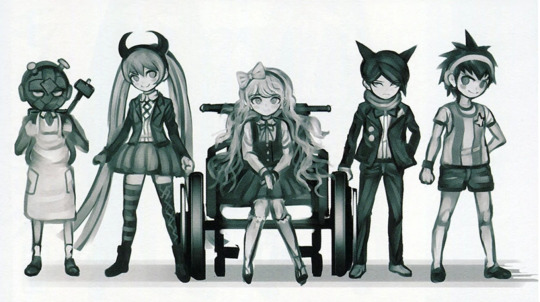
What is a Paragon?
To start, we will be focusing on the paragon trope, defined by Overly Sarcastic Productions as a hero that is both righteous and charismatic; your "do no wrong" hero, if you will. They do what is right all the time because of their personal beliefs. Protected by a heavy coat of plot armor, they gather a small group of companions who learn through their example to be better heroes; and together they overcome evil and spread peace throughout the land. That’s the basic formula of a paragon hero, if you want or need a more in-depth explanation, I would strongly suggest watching OSP’s video.
In the first game, we follow Naegi, your textbook paragon hero up against Junko Enoshima, the queen of charisma. I feel it important to mention that Junko, while almost a paragon in the way she gathers her followers, is missing the key ingredient of knowing she’s doing is right, because she admits to the opposite. She’s doing the wrong thing on purpose to see what will happen and how far she can take it.
While in the second game you look at Hinata (our paragon hero) up against Komaeda; someone who believes wholeheartedly they are right, but lacks the charisma to rally allies in-universe. You can love Komaeda all you want, but no one during the game's central plotline seems to particularly like him or want to follow him. Which makes Junko and Komaeda foils of each other in a way, each consisting one half of the paragon trope.
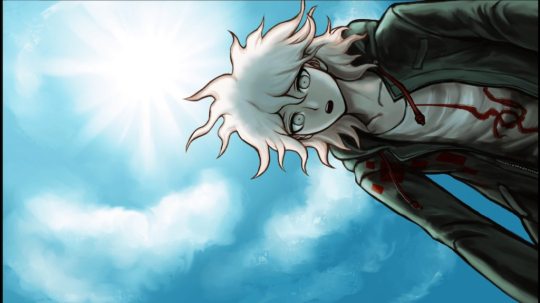
So what does this have to do with Another Episode? Simple, the dynamic is flipped. The Warriors of Hope are each paragon’s in their own right, varying on the scale of righteous and charismatic. But what makes them villains is that what they believe to be right, is in fact horrendously wrong. Their righteousness and charisma become their greatest flaw when pointed at the wrong enemy. It showcases how this type of character can be equally dangerous on the “wrong side”. We see this especially in Nagisa, who has openly convinced himself the ends justify the means. A place where children can be safe is the top priority, nothing can stand in the way of this ideal, not even the lives of other humans.
Additionally the real heroes of this tale are two halves of the paragon hero, like Junko and Komaeda. We have Fukawa; hideously unliked by everyone around her but righteous to a fault, and Komaru; an ordinary girl who appeals to everyone, yet has no strong beliefs outside of her need to feel safe. We are reminded throughout the game over and over again that the reason Komaru was picked as the heroine was not because she wanted to help others, but because as an ordinary girl. And this isn't portrayed as a bad thing. When teamed together, Fukawa and Komaru formed a paragon duo strong enough to overcome the obstacles before them. The game flat out states they are meant to work together, in order to make up for each others shortcomings.
So it is here we see the typical dichotomy of Danganronpa flipped in Another Episode. In which two character types that were typically used for villains are up against a group of paragons set on a path of destruction. Bringing to question, if someone like Naegi were to be sent on the wrong path, could they be redeemed and change direction?
And the answer the game gave us… was no.
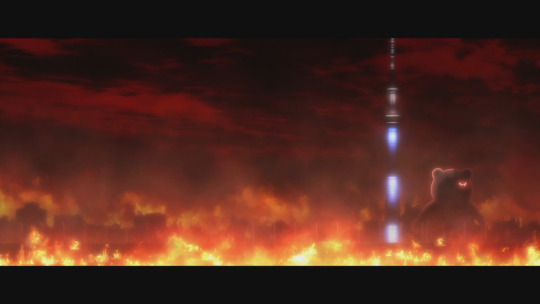
At both the end of the game, and the end of the anime we are left at a standstill where neither side will move. No outside force can change how a paragon thinks other than the paragon themself. Sure outside circumstances may kick-start introspection, but they can not change the way this type of character progresses by force. Not to say that change is impossible; but that journey would take more time then both the anime and game could allow, especially if we were to cover all five characters. But further discussion on the matter should be left on a character, by character basis.
Age and Developmental Stages (Time to Get Scientific)
As a BSN with a particular interest in pediatrics and psychology, a great deal of my analysis’ will refer back to my classes. Writing characters under the age of eighteen can be really difficult for writers, especially if they are not in constant contact with at least one individual from the age group they are trying to portray. Often times in media, we find child characters to be annoying, grating, and unrealistic; because on an instinctual level, we understand that's not how children that age typically act. You won't see an eight year old acting like a teenager, or six year olds throwing tantrums.
This is especially important, because children are not bound to the same rules as adults when it comes to understanding the world around them
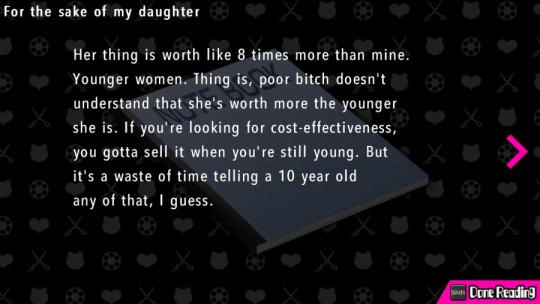
According to Kotoko's mother, Kotoko was still 10 years old while she was alive. And while we can't determine when exactly her murder took place, we can say it happened shortly after the despair incident but before Junko was locked in the school. Since the children still refer to themselves as Super Elementary School Levels, they can be no older than 13 based on the Japanese school system making them range anywhere from 10-13. So what does this tell us about how they should think?
Erikson’s theory of child development indicates they are just now gaining their own sense of identity outside of the roles they had been assigned. There is pressure to look to the future and what they want to be when they grow up. If they don't see a place for themselves in society or dislike the role they've been forced into, they will be more likely to rebel and cave to peer pressure. We see this especially with Nagisa who struggles between his role as the new leader verses his previous role as the dutiful son. If they are on the younger side, their sense of self worth relies heavily on the praise of their peers and mentors, seeking approval of their accomplishments. They define themselves through peers and test values/belief systems against society.
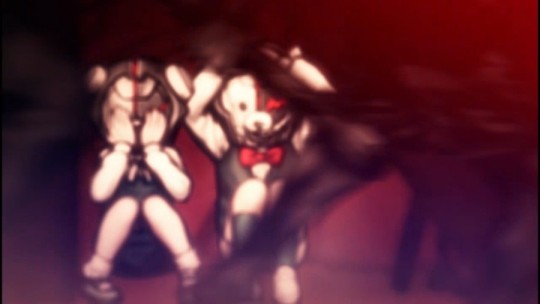
Above all else is an inherent inability to understand abstract concepts, or ideas that extend beyond where they are and what they know. Simply put, they cannot understand why adults are bad or that someone may have an ulterior motive. They know that their parents were bad, so all adults must be bad. This idea is reaffirmed when their peers share the same conclusion.
Everything is black and white, good or bad, right or wrong. They are just beginning to understand that an idea, such as freedom, means something different to everyone. Until they fully comprehend this, they are unable to fully empathize with individuals that don't share their viewpoint. When it comes to things that are not physical like love, empathy, morality, justice; they simply can’t understand it the way adults do.
In their mind, their view is right because they are good, anyone who disagrees must be wrong and therefore bad. This is not a moral thing, it’s how they cognitively process the world.
This is in no way saying their actions were justified. Simply, that they were just beginning to understand that there are things outside of what we see/say/do. The idea that someone can be both good and bad, nice yet dishonest; was not something they knew before Monaka betrayed them.
Coping Mechanisms in Children
When it comes to abusive situations, a huge emphasis is placed on power and control. Children in these situations will do anything to seek the control they do not have. This can include laying low, people pleasing, hurting themselves or others, aiming for over-achievement or perfectionism. It's not entirely uncommon to see children using multiple coping mechanisms at once, jumping from one to another until they regain a sense of safety and stability.
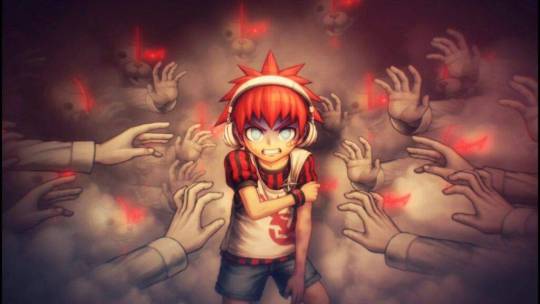
In times of stress, children will exercise their ability to control their perception of what happened. This can include denying the effects of trauma (Masaru), detaching their emotions from what happened (Kotoko) and failure to see that something can be positive and negative at the same time.
Children may also try to change or justify their situation. They can try to rationalize, or explain why something bad happened to them, even if the explanation is not grounded in reality (Jataro). Or they may try to please/appease those who hurt them by seeking approval (Nagisa).
I cannot emphasize enough the importance power and control has over children in these situations. Power is safety, exercising that power is a reminder of that safety.
Building the Children's Paradise has less to do with recreating Lord of the Flies, and more to do with creating a place where they have control over everything in their environment (rules, peers, and who is allowed close to them). Anything that threatens their position of power is an immediate and personal threat to their own sense of safety. For example, the peers they consider friends are brainwashed into doing exactly what they say. The only adult allowed near them acts as a slave to be manipulated and mistreated.
The Influence of Role Models and the Importance of Subjective Information
We know very little about their parents from a omnipotent view. With the exception of one letter from each parent, all information comes from their victims. However, there is still much we can determine about them, in how the children themselves behave.
According to the "Identification" theory; a child's behavior patterns, beliefs, and values are greatly influenced by their parents. And not because it was something that was taught, but it was something they saw routinely growing up and adopted themselves. While this does not eliminate their ability to make their own choices, a great deal is to be said about learning through example. Self destructive behaviors like substance abuse, low self-esteem, and violent behaviors are often traits learned by watching their parents. We know in great detail about what the parents did to their children, but very little about what their parents did to themselves or peers.
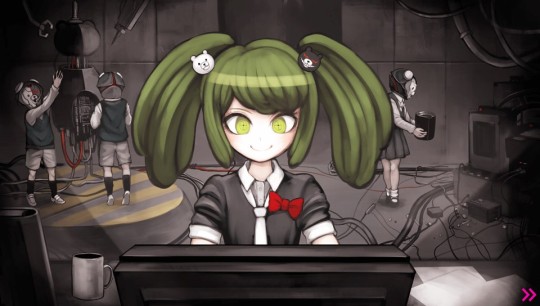
Likewise, the kids have an opposite view of Junko which is equally as biased and inaccurate. According to the Warriors of Hope Junko is sweet, caring, and blameless. As someone who met one of their most neglected needs, she represented a sense of security and love they never had. But we all know Junko's true nature and how manipulative she can truly be. The children actively deny any accusation against her because she became, essentially, their surrogate parent. It's not clear how involved she was with them, but we are given a sense that at face value, she took care of them the way a big sister ought to. Once again, an example of this black and white thinking still held by the children, it also gives us insight on the validity of their information.
Questions like "Why does Junko want to destroy the world?", "Why is my dad an alcoholic" or "Where’s the rest of my family?" may not have occurred to the kids as important, and certainly were not included in the original narrative. With no intent to excuse the abusive behaviors, it's important to keep in mind we are given a very narrow and subjective view of their home lives that purposefully excludes any positive redeeming aspects. This is all by Junko's design; as a way to keep them in a traumatized, despair-induced state that would facilitate the killing of adults.
We know this, because several rules of the Children's Paradise Commandments expressly forbid remembering the past and emulating the behaviors exhibited by their parents (including Nagisa trying act as a competent leader). Any positive influences their parents (or any other adults) had are actively being repressed to perpetuate the massacre of Towa City.
Cultural Considerations
If you're reading this, there is a high probability that you live someplace other than Japan. Your views on everything are influenced by the culture you grew up in, and just because we can relate to other cultures, doesn't mean that we completely understand them and the issues their country faces on a daily basis. The best we can do is look at the window they provide us.
In Japan mental illness is a taboo topic to discuss publicly. It's seen as something to be ashamed of or suffer in dignified silence to protect the family's reputation. Equally taboo is the discussion of child abuse, with the Japanese government only starting to track of cases in 1990. 50% of all sexual abuse cases go unreported because of Japan's cultural stance on upholding strong moral values closes off the discussion, in a “it could never happen here” sort of way.
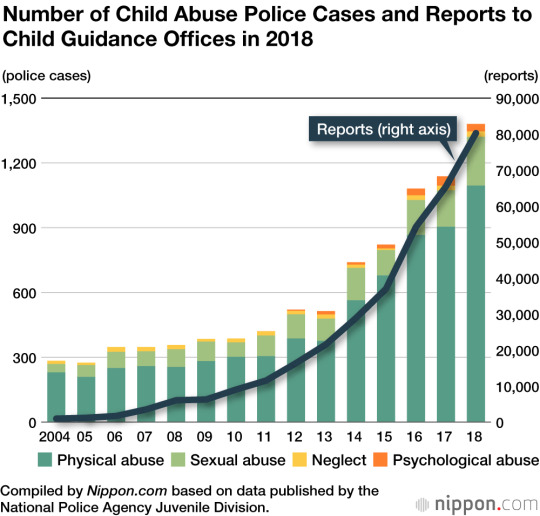
Foster homes in Tokyo are packed to capacity with kids that were taken from their abusive environments with nowhere to go. Not because people don't care, but because culturally, the discussion of abuse and having an adopted child are not embraced the same way as in other cultures.
In fact, both Kotoko and Nagisa point out that the surrounding adults wouldn't help them. It's not entirely unthinkable, given Japan's history, that they had tried to reach out for help; only to be let down by a system that was still adapting to discussing the topic. The revolution of reporting and advocating for children's rights is still a new and growing practice in Japan.
When Danganronpa Another Episode released in Japan, the number of child abuse cases were the highest ever, surpassing 70,000 reported cases for the first time and has been rising since they first started reporting cases. This isn't to say people were abusing their children more over the last few decades, but that people's stance on reporting abuse has drastically changed and continues to improve. Games like Another Episode not only champion the cause of child advocacys among newer generations, but spreads it to a wider audience, including people who will form and change the governmental and social aspects of Japan's culture in the future. Games like Another Episode provide an important platform to discuss societal issues that have for years been ignored because talking about them was 'uncomfortable.' To unironically quote G.I. Joe. "Knowing is half the battle."
Abuse in DR
The topic of child abuse is not a new one to the DR universe. In fact several characters share similar childhoods and have spoken quite openly about them.
(Masaru: Oowada, Kazuichi)
(Jataro/Monaka: Fukawa, Mikan)
(Kotoko: Sayaka, Hiyoko, Akane)
(Nagisa: Togami, Ishimaru)
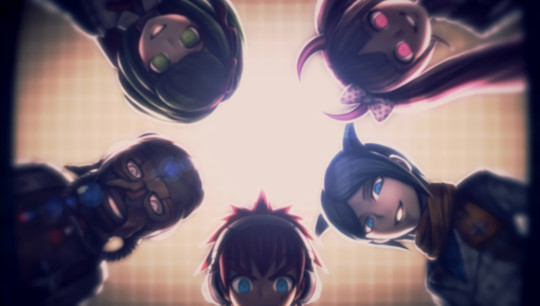
What separates the Warriors of Hope from the other characters, is their age and proximity to these negative events growing up. We closer see the impact of what these things to do to their personality and worldview because they're still children. It's all the more heartbreaking because we understand, while dramatized, it is something very real and in some cases, relatable. Seeing their stories play out, makes us uncomfortable, because we know that there are children out there that experience similar pain and there is very little we can do about it at the very moment we are reminded these things exist.
However, it is important to acknowledge the things about society that upset us, as it is a crucial step in orchestrating change.
I'd like to end by highlighting charities and organizations working to fight child abuse in my own country. If you do not live in the United States I would highly recommend finding reputable charities in your area that are working to help, if you are interested in volunteering or donating to the cause.
Thank you so much for reading this crash course through child psychology and I look forward to seeing you in the next analysis.
http://www.ylc.org/
https://promisehouse.org/
https://lnfy.org/
#danganronpa#ultra despair girls#danganronpa another episode#danganronpa ultra despair girls#drae#long post#character analysis
10 notes
·
View notes
Note
Hey, I’ve been reading a lot of your BNHA metas, (they’re all absolutely awesome btw) and I was wondering about two things, what kind of mental illness do you think Shigaraki has? And I read a post somewhere that speculated that he might have suffered a tbi when his father hit him with the tree sheers, do you think that might be true?
Hello anon, thank you for your ask!
I will try to answer your questions the best I can, however beforehand I think it’s important to note that I don’t really like diagnosing characters outside of like specific examples where the authors tell us this is the disease they were attempting to portray, or headcanons. Shigaraki clearly shows signs of mental illness, but I don’t think Horikoshi writes characters by looking up a list of symptoms in the DSM and then writing them based on that.
Also yes, the two clearest examples of mental Illness (Shigaraki, Twice) are both villains but I have faith that the mental illness of Shigaraki is an instance where it’s used to humanize him and show how much of a victim of a system both characters are, rather than just to give the villain traits that are abnormal and therefore creepy and dangerous.
I can’t give you a specific dianogisis but I can give you a more in depth look at several symptoms that Shigaraki displays.
Excoriation

Excoriation disorder is an obsessive-compulsive spectrum mental disorder that is characterized by the repeated urge or impulse to pick at one’s own skin to the extent that either psychological or physical damage is caused. In Shigaraki’s case it’s clearly a stress response that is aggravated the more violent, unstable or dangerous a situation he is put into.
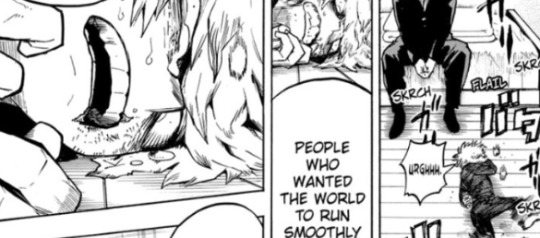
Which is why I find claims that Shigaraki is content with violence, or likes being a killer and is comfortable living this way to be false. Because Shigaraki’s own body constantly rejects him. He feels a compuslive need to scratch and harm himself because his body cannot handle the stress of being violent. It’s a stress response because Shigaraki does not actually on some level want to be doing these things, and living in a constant state of stress and harm makes him more compelled to vent his stress by following his compulsions.
The compulsion he feels can sometimes get so bad that in childhood he was rolling around the floor, crying and frantically scratching his whole body. This is not what All for One said and him holding back his urge to kill, but rather Shigaraki responding to the stress. Shigaraki is seven and was put in front of two homeless people who were threatening to harm him and he already came from a physically abusive household. He’s in unbelievable stress with no healthy way of venting it, and thereofre he compulsively self harms.
GAME TALK
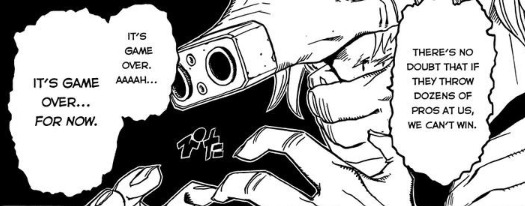
In general Shigaraki uses a lot of game talk. This is not so much a symptom of mental illness necessarily as it is a coping mechanism, but the goal is for Shigaraki to distance himself from reality. Basically it’s a mechanism for rgaining control because if you imagine life as just one big game where you are the player, you feel much more in control then some random kid who lost his family in a freak accident then got picked up by a super villain. Gamespeak is also a way of being deeply impersonal with the situation, in case it goes bad Shigaraki can say it’s just game over. It’s a layer of distance between him and reality, like I said, escapism to cope. His insistence of using game terminology for everything could also be seen as a “special interest” but once again that depends on your intepretation Shigaraki shows a whole cluster of symptoms that overlap with a lot of things.
HIGH ATTENTION TO DETAIL
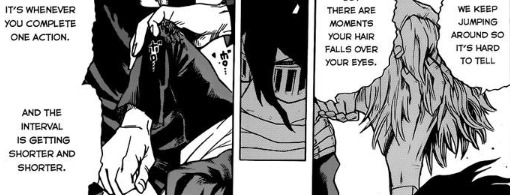
Shigaraki in a fight where he and AIzawa are jumping around trying to kill each other, Shigaraki is able to notice a detail as minute as when the hair falls over Aizawa’s eyes it stops, and also that his quirk was weakening because the tiny seconds long windows were getting shorter and shorter.
This is an extremely small detail to notice. Hyper-sensitizing, or hyper-attention to detail is another sign of mental illness, because usually the brain filters out superfluous details like this because otherwise noticing everything in that fine detail would overwhelm the senses.
Immaturity
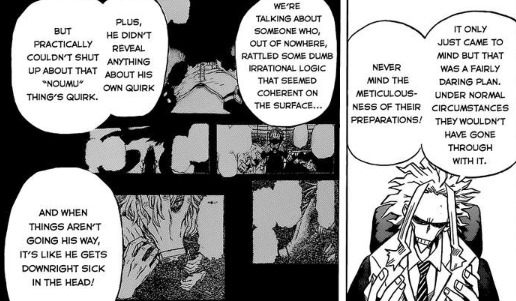

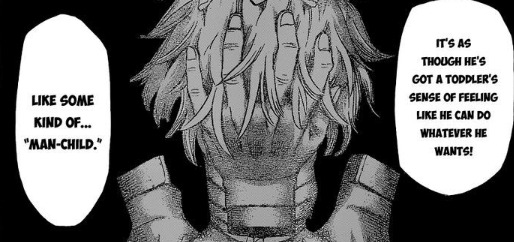
Shigaraki is completely unable to handle his negative emotions like a well-rounded adult. Though, I dislike how All Might and the others phrase it in this discussion because it is a pretty ablist description (downright sick in the head, a toddler’s sense of feeling like he can do whatever he wants). (the ablist part is that they’re using symptoms of his clear mental illness to dehumanize him.)
Regardless, Shigaraki of course does act like a man child, constantly talking about games, giving up easily, not having the patience to converse with others especially in situations he does not want to be in, throwing tantrums.
Children who are abused and neglected especially to the extreme extent that Shigaraki has, show long term developmental (that is term for the process of growing into a full adult) and behavioral problems. To the point where some studies have shown even the brain’s chemistry is permanently effected and the brain grows differently.
Children need a stable environment, and also positive role models for what adults act like to grow into full fledged adults, Shigaraki had neither of those. In fact he was also raised almost entirely outside of society except for the first five years of his life, so there is also no outside influence on his upbringing as well, which is why he is like a child, egocentric, unable to handle his emotions, because mentally he was never given the chance to develop past one.
ISOLATION

This is something that Shigaraki showed at the start of the series, but also has shown to develop past. At first he never left his room and from the several trash bags it’s quite obvious he spent long periods of time in there without taking care of himself or the environment around him in any significant way.
Shigaraki is no longer isolating as a result of having gotten closer to the league, he is basically available to them at all times and does not shut them off in any significant way. Which in this quick tangent we can also talk about symptoms Shigaraki does not have. Shigaraki is able to read a room pretty clearly, and knows how to hide himself in a crowd enough to keep Deku hostage with no trouble at all, and even leave the scene with Uraraka there without provoking her into attacking him or tipping her off what he was doing right away. Shigaraki is fairly competent at reading other people and he does have social skills so he’s not like someone who never sees the light of day or cannot interact with others and is clueless on how people think.
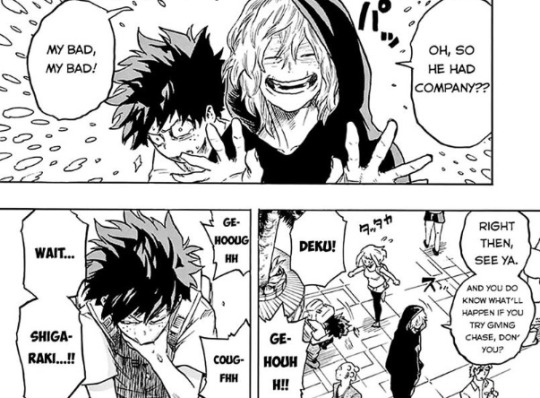
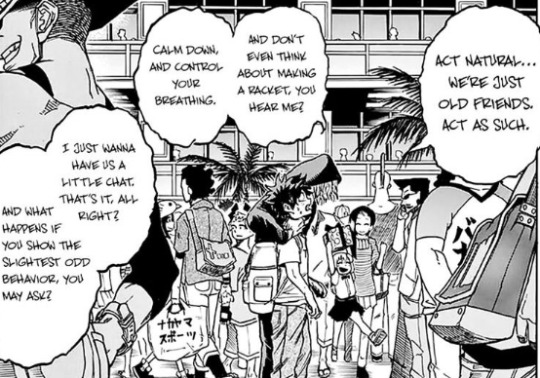
He’s also shown to be capable of making emotional connections with other people, and also of being considerate to those people’s needs. Which also shows that Shigaraki is capable of communication and also has an awareness of the feelings of other people and the ability to empathize, he is just choosy about who he makes connections with. He is definitely not someone unable to form an emotional connection with another person.
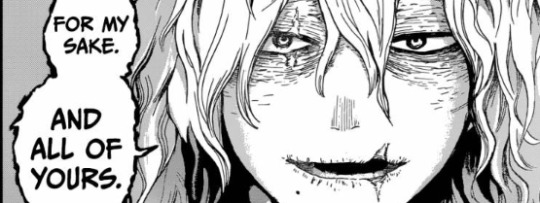
Shigaraki also shows a pretty flagrant disregard for all social norms, but that can be a result of being raised outside of society all of his life.
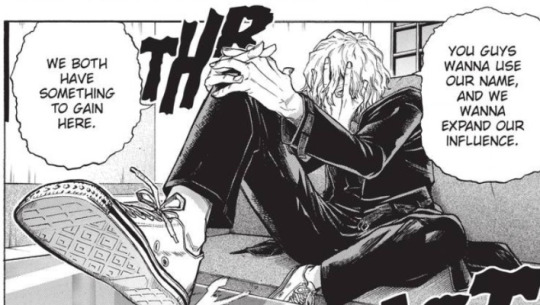
Shigaraki also likes to piss people off on purpose, almost like he is testing their boundaries and what he can get away with the same way a child playing around might.

Dissociation
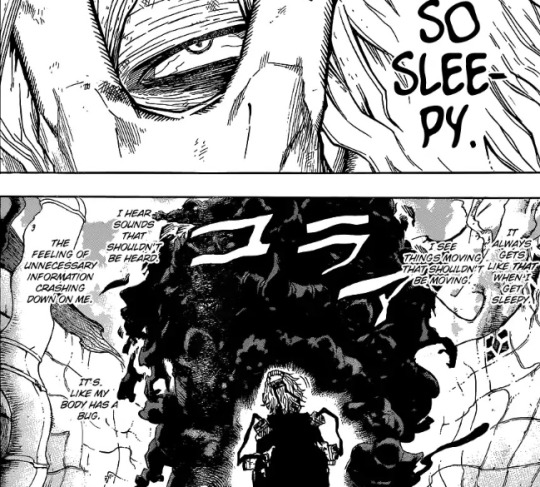
We have seen Shigaraki experience Dissociation in both senses of the word. First we have seen him physically detach himself from his feelings, and his own body in the middle of a fight and still continue on in a fugue-like state.
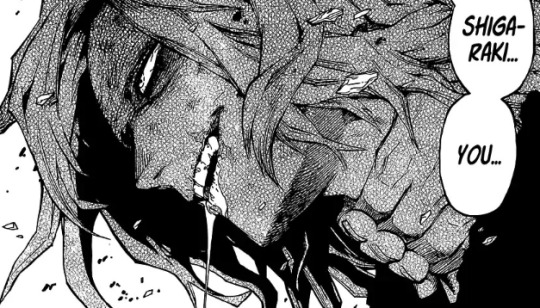
He experiences dissociation in the sense of the word meaning periods of detachment to your body, drifting away from your consciousness, severe feelings of alienation from himself, extreme difficulty concentrating or holding focus to the moment, his perception of both time and the area around him slipping to levels that are borderline hallucinogenic.
Dissociation is a mental process where a person disconnects from their thoughts, feelings, memories or sense of identity.
Shigaraki also displays traits of what is more classicly known as Dissasociative identity disord. He has two names, and clearly considers the life of Shimura Tenko to be separate from Shigaraki Tomura for a long time at the start of the manga. It might not be full on DID, but he at least dissociated his memories away from himself long enough that he forgot all of them like those memories belonged to another person, not Shigaraki but rather Tenko.
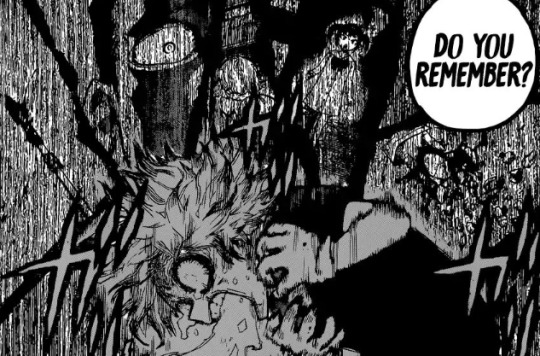

Shigaraki also foils Twice pretty heavily who developed actual dissociatve identity disord. He even shares similiar symptoms of speaking to himself when he speaks to the hand of “father”. I am not saying he has full on DID like I said I’m not diagnoising just that he displays several symptoms of it. He also came from an abusive household at an incredibly young age, which is where DID most commonly manifests.
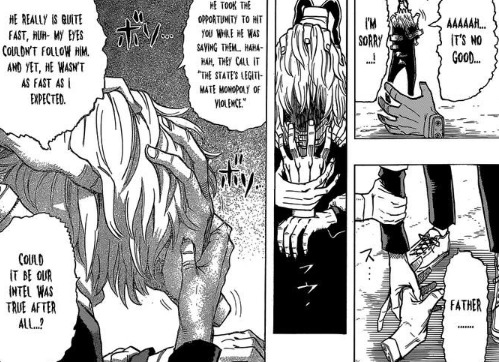
Shigaraki also shows signs of flashbacks when his memories return at inconvenient times during fights when direclty exposed to violence, or he experiences a trigger reminding him of his past. Flashbacks are a symptom that have the most in common with Post Traumatic Stress Disorder.
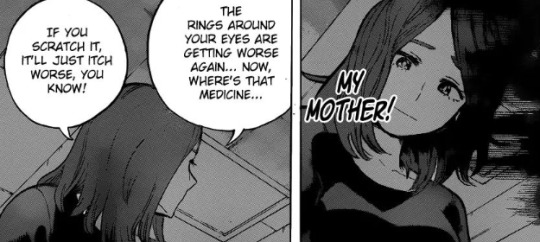
To answer your question on whether Shigaraki has a brain injury from when his father hit him with shears, there is evnidence suggesting he could have suffered brain damage, especially in the symptoms that he shares with Twice. However, at the same time Shigaraki also would have developed brain damage either way. Post Traumatic Stress Disorder is something that permanently rewires the brain after exposure to trauma. His brain has suffered a traumatic injury regardless of whether or not it was the garden sheers that did him in.
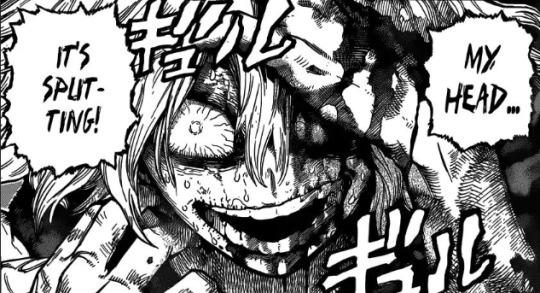
Suicidal Ideation / Self Harm

Shigaraki in general wishes to not exist, or to destroy everything so it will not exist anymore. Even if it’s not a direct wish for suicide that symptom is called suicidal ideation. It’s intrusive and persistent thoughts of suicide. The likely cause is once again, Shigaraki is absolutely not comfortable living like this, and is constantly overwhelmed with stress and pain and is seeking an escape.
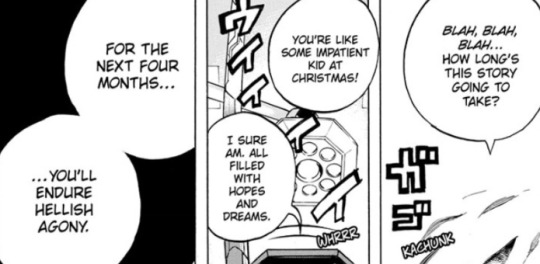
Shigaraki also actively seeks out harm. The same way he obsessively compulsively scratches, he puts himself into harmful situations like the extremely painful hellish surgery the doctor said he did not even have to endure if he did not want to. He feels compelled to harm himself, even when he is not fighting against someone else. He inflicts harm on himself becauseit is once again an unhealthy way to process his emotions. Oncce again all of these symptoms are there not to make Shigaraki out to be terrifying and incomprehensible because he is mentally ill, but rather to show he is a human being caught within the cycle of abuse with extremely unhealthy methods of coping with that fact.
#Anonymous#metasks#shigaraki tomura#mha meta#shigaraki meta#my hero academia#shimura tenko#tomura shigaraki
282 notes
·
View notes